Minister of Population: we are building our future in Estonia
What else is the Integration Foundation planning this year?
Kuidas tagatakse eesti keele kasutamist õppekeelena?
Kuidas augustikuus tasuta eesti keele kursustele registreeruda?
Kuidas endale parimat keelekursust valida?
Mida sügishooajal Tallinna ja Narva eesti keele majades õppida on?
Kuidas edeneb koostöö rahvusvähemuste ühendustega?
Millise toega Eestisse tagasipöördujad arvestada saavad?
Meie kalender
Meie uudised
Räägi kaasa: kuidas eesti keelt ja meelt hoida?
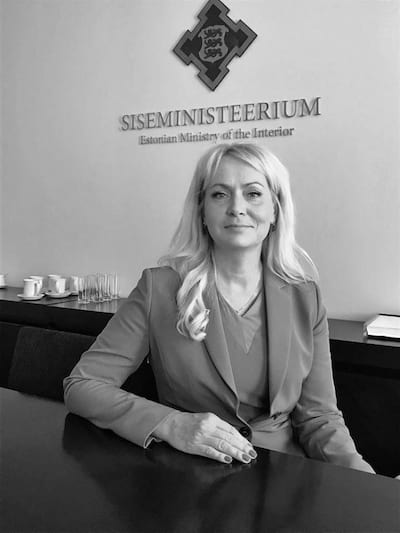
Riina Solman, Minister of Population as a new member of integration team talks about responsibilities and tasks of the ministry, also about joint challenges and activities.
As Minister of Population, what are you responsible for? And what challenges do you face?
The Prime Minister has decreed that as Minister of Population I’m responsible for a number of areas: the planning and coordination of population, family and immigrant adaptation policy; the inclusion of foreign Estonian communities; the planning and coordination of the development of civil society; and matters pertaining to population-related activities and religious associations.
First and foremost, the Minister of Population deals with population policy. The state has always considered this important, and there have been quite a few ministers who have dealt with population issues since Estonia regained its independence. The most recent one to do so was Urve Palo 10 years ago, whose responsibilities were divided up between other ministries following the financial crisis. My main task is to focus more keenly again on issues relating to the preservation of the Estonian nation, language and culture in conditions of decreasing population numbers. The main aim is to raise the birth rate here in the country and to manage migration on our own terms, which is to say to allow people into the country who we want to allow into the country, not just sit back and let it take its own course.
Migration, births – which is to say the birth rate – and deaths all have a bearing on population. Because the numbers of those who are at the right age to have children are decreasing, our birth rate will inevitably be negative for some time yet, and that’s despite people’s overall health and life expectancy having improved. An increase in the population is something we’ll only be able to talk about much further down the track, and will only be possible once the birth rate has been at the level necessary to ensure future generations, or even slightly higher than that, for some time. We’re below that rate at the moment, albeit not by that much – it’s currently around 1.7, but needs to be 2.1 to take us into positive territory again. But I’m optimistic that that’s an achievable goal. Surveys have shown that the ideal family for almost half of all women in Estonia is one with three kids.
We shouldn’t view the aging of the population as a problem. Leading longer, healthier lives is something we all want. The average age is going up precisely because we’re living longer. That’s a positive thing, and I hope that improvements in health indicators in Estonia and growth in life expectancy continue at the same pace.
The Minister of Population also shapes family policy. To date, the aims of family policy have mostly been socio-political, by which I mean primarily connected to guaranteeing the welfare of existing children and families and their ability to cope. But the Minister of Population adds their own view to this, which aims to boost the birth rate. There are a number of aspects to this.
One is that home, family and children are inseparably linked. That’s why it’s vital to ensure the availability of a home to families with children if we want to see the birth rate go up. Being unable to find a suitable home stops people from starting a family or having more children. And the more children there are, the less space there is per family member and the more often families face a lack of space, which has a negative effect on the quality of life of the family, including its kids. This shortness of space stops a lot of families from having the number of children they want. The Minister of Population works through the housing-related proposals in the coalition agreement, determines the costs involved and draws up an action plan for the implementation of housing policy aimed at families with children.
Another is that families with a large number of kids are responsible for raising almost half of the next generation of Estonians. A large family is a big responsibility, including in the financial sense. The state needs to continue working on support and other measures based on the needs of families with lots of kids so that more children are born in the country.
How do you see yourself getting involved in the field of integration, and with the activities of the Integration Foundation?
My involvement is clear and direct – the future of the Estonian population goes hand in hand with a cohesive Estonian society. In my role I consider it very important to talk to representatives of the different nationalities residing in our country and to impress upon them all that we’re building a joint future here in Estonia. I have a lot of respect for the fact that the national minorities who live in Estonia, big and small alike, value their cultural heritage, are proud of their roots and identity and want to pass all that on to future generations. These are communities with strong, long-standing traditions, and that enriches our society as a whole. These minorities often suffered a lot during the Soviet era, being dragged from one place to another, where they basically had to start their lives from scratch all over again.
It makes me think of the ‘Sabantuy 2019’ festival that was held in Tallinn in June, a pan-European folklore festival of the Tatar people that I had the honour of welcoming to the city on behalf of the government. And then there was the song and dance celebrations of the Ingrian Finns in Kose, which was held for the 29th time. I have Ingrian Finnish roots on my mother’s side, so I heard a lot during my childhood about how much they’d suffered and how difficult life had been for them during the Soviet era. The Ingrian Finns who found themselves after the war in Viljandi, where I was born, were Russified – their kids were put in Russian-language schools, and my grandfather’s name was changed in his passport from Antti to Andrei. I cherish my Ingrian Finnish roots; I feel they really enrich me. They’re a blood tie between two Finno-Ugric peoples. My father’s Estonian, a fourth-generation Viljandian; you might even say he was a proper Mulk [from the Mulgimaa region – Ed.]. My mother’s Ingrian Finn, but a big, sprawling branch of her family grew up here in Estonia, much bigger than on my father’s side. Those are my roots, very strong roots, and I’m proud of them. I think I got my doggedness, my flexibility, the fact that I can adapt to things and that I’m pretty unshakeable from my mother. The intellectual side of me, my love of reading and my interest in the world as a global place came from my father.
As the Minister of Population I view the Integration Foundation as a very important partner. I’m glad I’ve been able to keep so closely in touch with the management of the foundation since I took office and that we’re on the same wavelength in what we’ve discussed and the thoughts we’ve exchanged. There’s a very clear intersection between us in terms of fulfilling the point in the government’s coalition agreement about advising people returning to Estonia from abroad, and I’m pinning a lot of hopes on the thought we’re both putting into the worldwide Estonian cooperation committee for when we start preparing the Global Estonia programme.
You’re one of the driving forces behind the programme. What is it about? What will it give those who identify as Estonian, and for that matter those who live in Estonia who don’t speak Estonian as their mother tongue?
In the coalition agreement the government has set itself the goal of launching the Global Estonia programme to activate and include members of the Estonian community from all over the world. The point in the agreement that touches on it gives an idea of the main thrust of the programme as well: “We support the promotion of Estonia’s national culture internationally and the preservation, development and study of Estonian language and culture, with the involvement of our communities abroad and good will ambassadors.”
It would probably be better to refer to it as ülemaailmne [‘worldwide’ – Ed.] in Estonian rather than globaalne, since ‘global’ is a loan word. On my proposal the government formed a cooperation committee for the programme in June, with myself as the chair and the other members being fellow ministers – the Minister of Culture, the Minister of Education and Research, the Minister of Foreign Affairs, the Minister of Social Affairs and the Minister of Foreign Trade and Information Technology – and representatives of the four biggest umbrella organisations of foreign Estonians, those being the Estonian World Council, the Estonian National Committee in the United States, the Estonian Central Council in Canada and the Association of Estonians in Sweden. There are also representatives of the Integration Foundation, the Estonian Evangelical Lutheran Church and the supervisory board of the Countrymen Programme on the committee.
At first the committee will be a discussion group that will lay the basis of the Global Estonia programme (which we’ll continue to call it for now). Not that we have a great deal of time to get it up and running – the first meeting of the committee will be in Tallinn in September, and based on the working plan of the government the programme needs to be ready by July 2020. That said, I’m convinced we’ll manage in that time, and the programme will then come into effect from 2021 and serve, by and large, as a continuation of the current Countrymen Programme.
The Countrymen Programme has fulfilled its remit very well, and although more money could always be allocated to it, which is true of any programme, it’s achieved quite a lot over the years – whether that’s supporting Estonian language teaching outside of the country, collecting and preserving foreign Estonian cultural heritage and making it available to people, supporting the preservation of Estonian culture abroad and shaping a sense of togetherness among Estonians, making it easier for Estonians abroad to return to Estonia or serving the spiritual needs of foreign Estonians. All of these things will be important in the new programme as well.
In preparing it we need to be clear on what the expectations of Estonians living outside Estonia are in terms of the state and the programme in addition to what’s already been taken into account in prepping and implementing the Countrymen Programmes to date. There are a couple of things I personally feel should be given more attention in the new programme. One is the biggest Estonian community outside of Estonia, which is the Estonian community in Finland. Their needs and concerns and expectations deserve to be addressed in the programme. Estonians living in Finland aren’t yet represented on the cooperation committee, but I’m hopeful that an umbrella organisation will be formed at the end of August for the Estonian community in Finland and that it will be represented at our first meeting in September. The other keyword for me is the young Estonians who live in different countries all over the world. I attended the youth and future seminar that was held as part of the ESTO days in Helsinki in June and heard young Estonians from almost 30 different countries talk about what worries them and what makes them happy and what they miss when it comes to their ties to Estonia and their relatives who live here. I’ve since met with those youngsters again, and in my view their voice, their wishes should definitely form part of the activities of the Global Estonia programme, and for that matter of the programme itself. Actually, there’s one other thing I think the programme needs to look at as well, which I mentioned earlier: people coming back to Estonia.
As readers of this newsletter will no doubt be aware, alongside the Global Estonia programme we’ll also be continuing with the Integrating Estonia programme, preparations for the next period of which are being made at the moment. Needless to say both programmes and the activities they involve should be as closely linked as possible so that they speak to everyone connected to Estonia, whatever their first language might be.
What issues can those who contribute to integration in Estonia in some shape or form approach you with?
I’d like to think that everyone contributes to integration in Estonia in some shape or form. A well-functioning, cohesive society is in everyone’s interests, and no one can really claim to be a successful member of that society if they say the issue doesn’t affect them. Anyone can get in touch with me, whether they have questions or suggestions, concerns or something positive to share. Population and family policy touches on everyone’s lives and it goes without saying that the issues surrounding it are important to the minister responsible for them.
Do you have anything planned that the integration team could help with?
The Estonian state is a whole made up of parts, and all those parts – ministries, other state agencies and institutions founded by the state – should operate as a whole. So in that sense the ‘integration team’ you mention is one we can all consider ourselves members of: all of us, and in fact not just the state alone, should be doing everything we can to ensure that Estonia is a cohesive society. But if by ‘integration team’ you mean more specifically the Integration Foundation itself and the huge number of people who work with you, then let me say that we’re very grateful first and foremost for everything the foundation’s already done in advising those returning to Estonia and helping to resolve the issues that have arisen, but also that our thanks go out to you in advance for everything you plan to do in the field from here on in.
Do you have any particular expectations regarding the activities of the Integration Foundation?
The foundation boasts an awe-inspiring amount of experience when it comes to solving the problems and challenges faced by the state and society here in Estonia. You’ve made an enormous contribution to social cohesion, and there’s plenty for us to learn from all that experience in planning the Global Estonia programme, which we’ll set about doing together, including with the input of your director. I’ve met with the management of the foundation quite a few times now and I just know we’ll be working closely together, and very much on the same wavelength.
I wish everyone at the foundation, its partners, its supporters and readers of this newsletter a lovely last month of summer and every success going forward!
Riina Solman, Minister of Population, met with our team at Tallinn's Estonian Language House on June 4, 2019:
 Irene Käosaar, Director of the Integration Foundation, talks about what improvements and events our team is expecting this year.
Irene Käosaar, Director of the Integration Foundation, talks about what improvements and events our team is expecting this year.
What services can the foundation’s partners be sure will be provided in the second half of 2019?
In recent years the Integration Foundation has focussed a lot of its energy on being more available to those who need its services. We have launched our Estonian Language Centres in Tallinn and Narva, and we are happy to report that our language courses and other activities supporting language use will be continuing apace this autumn.
Immediately after the public holiday on 20 August, registration will open for our language courses. We know that the free courses are very popular and that not everyone will get a place, which is why those who are unable to take part for one reason or another are very welcome to come in to our Language Centres for a consultation. By talking to you in person, our friendly and supportive advisors can determine the most suitable activities for you – whether that be one of the language courses also starting in the Language Centres in autumn (to which participants are being referred specifically via consultations), one of the courses offered by our partners, our language clubs or cafés or things like our quizzes and film and discussion evenings, where you can chat in Estonian about topics that interest you.
In addition to language learning, the arrival of autumn will bring with it the chance to be part of the cultural diversity of national minorities. A number of events will be taking place in September for national minority cultural associations, but there will also be public events at which the minorities will be promoting their cultures. Diversity enriches, and people are often surprised at just how diverse Estonia’s cultural life actually is in the context of national cultures.
Thanks to the application rounds organised by the foundation, a wide range of sports and cultural events have really taken off. The second round of applications for major projects in Ida-Viru County will open in early September. Through it we can offer our support to event organisers who want to contribute to the development of enterprise in the county through sports and culture.
The foundation is also expanding its reach even further as a partner supporting the Global Estonia programme. There are not all that many Estonians around the world, making it even more important that we all exist within the same information space regardless of where we live. Our advisor to those returning to Estonia commenced work in May and has started the ball rolling on a nationwide support network, and in autumn a cooperation specialist will be joining the foundation in order to bolster the exchange of information between Estonians living in Estonia and those residing outside the country.
What events do you recommend that people mark on their calendars?
Our now-traditional international integration conference will be held on 14 & 15 November. Its target group is officials, researchers and others working or involved in the field of integration. This year’s conference will focus on the role of linguistic diversity in integration.
Estonian Language Week will take place from 23-29 September, as part of which a variety of events promoting Estonian will be held throughout the country. The main organiser of the week is the Estonian Institute. The Integration Foundation is working with Elron to contribute to a ‘language train’ project that will give anyone interested the opportunity to travel from Tallinn to Narva while practising their Estonian in a relaxed atmosphere.
What does the rest of the year hold in store for the team at the foundation?
Everyone is looking forward to the completion of our new office in Narva. Over the last year we’ve put a lot of effort into improving both our working and learning environments – after all, the foundation is both a place of employment for our staff and a study site for our clients. We opened our Estonian Language Centre in Tallinn at the start of the year, and we will be opening our new office in Narva and the Estonian Language Centre there in early October. We are finally settled: we have created almost 20 new positions in the foundation in the last couple of years, and relocated in both Tallinn and Narva, so now we can focus on being even more effective supporters of our clients and partners in both cities.
 Integratsiooni Sihtasutuse keeleõppe valdkonnajuht Jana Tondi ning Haridus- ja Teadusministeeriumi keeleosakonna peaekspert Riina Koolmeister käsitlevad, mis on juba käsil ja veel plaanis, et eesti keel oleks kasutatav vajalikul määral õppekeelena.
Integratsiooni Sihtasutuse keeleõppe valdkonnajuht Jana Tondi ning Haridus- ja Teadusministeeriumi keeleosakonna peaekspert Riina Koolmeister käsitlevad, mis on juba käsil ja veel plaanis, et eesti keel oleks kasutatav vajalikul määral õppekeelena.
Integratsiooni Sihtasutuse keeleõppe valdkonnajuht Jana Tondi:
Millist rolli mängib Integratsiooni Sihtasutus selles, et eesti keel oleks kasutatav vajalikul määral õppekeelena?
Meie sihtasutusel on küllaltki nähtav ja juhtiv roll eesti keele õpet pakkuval maastikul, seda nii õpetajatele kui ka õppijatele koolituse pakkumisel. Me tagame eesti keele õppeks erinevad võimalused Eestis elavatele eesti keelest erineva emakeelega täiskasvanutele ning noortele. Samuti ka välismaal elavatele eesti päritolu noortele. Olgu selleks tavaline keelekursus, keelelaager, pereõpe või töötuba.
Sihtasutuse eestvedamisel ja toetusel väljatöötatud metoodilistel juhenditel ning õppematerjalidel on jätkuv menu, olgu selleks L. Kingisepa, K. Salu, K. Kaljula „Mängime eesti keeles“ või S. Laidla ja Ü.Lennuki „Keeleõpetaja laagriraamat“. Samuti eesti keele e-õppekursused Keeleklikk, Lood elust enesest, Pille ja Lauri lood, Speakly, L. Kingisepa, P. Kärtneri „Mängime ja keel saab selgeks!“, H. Metslangi juhend iseseisvaks keeleõppeks jt.
Vajadus tegeleda õpetajate keeleõppega on olnud üks sihtasutuse põhisuundadest. Täna on õpetajate keeleõppe korraldamise keskmes eesti keele kursused just Ida-Virumaal töötavatele ebapiisava eesti keele oskusega haridustöötajatele. See vajadus tuleneb nii riigisisestest eesmärkidest kui ka õpetajate endi reaalsest vajadusest. Vajadusest ennast erialaselt täiendada, osaleda täienduskoolitustes, võtta osa üleriigilistest konverentsidest või seminaridest, olla aktiivne oma valdkonnas, seltside või ühingute töös.
Keeleinspektsioon teostab riiklikku järelevalvet keeleseaduse täitmise kohta ning tegevusaasta aruannetes esitatud andmetest selgub, et eestikeelse aineõppe korraldamisel on kõige rohkem raskusi Ida-Virumaal, aga ka teistes Eesti piirkondades, sh ka Harjumaal ja Tallinnas.
Oma keeleoskust soovivad parandada eesti keelest erineva emakeelega üldhariduskoolide ja lasteaedade pedagoogid, eesti keele ja eesti keeles õpetatavate ainete õpetajad, kutseõppeasutuste õpetajad.
Meie sihtrühm ongi tavaõpetajad Ida-Virumaal, kes soovivad parandada oma eesti keele oskust ja sooritada B2- või C1-taseme keeleoskuse eksam. Selleks pakume õpetajatele Ida-Virumaal 250-tunnilist keelekursust, milles on oma kindel koht traditsioonilisel keeletunnil, samuti õpetaja iseseiseval õppel, sh e-õppekeskkonnas ning erinevatel keeleõpet toetavatel praktilistel tegevustel keelekeskkonnas.
Peale keelekursusel õppimise saavad õpetajad oma eesti keele oskust praktiseerida ja lihvida eesti keele- ja kultuuri tundmise klubides, kultuurimooduli erinevates tegevustes, aga ka eesti keele majade õpetajate ja eestvedajate korraldatud keelekohvikutes ja aruteluõhtutel. Samuti töötubades, ekskurssioonidest osa võttes ja praktiliste tegevuste käigus. Olgu see siis filmi vaatamine, hooajamäng, muuseumikülastus või käsitöö- või kokandusõpikojast osavõtt.
Lisaks pakub Integratsiooni Sihtasutus koostöös Tartu Ülikooliga eesti keele 50 tegevõpetajatele koolitusprogrammi, milles eriline tähelepanu on eesti keele sihtkeeles õpetamisel, sh kaasaegsel metoodikal ja parimatel keeleõppepraktikatel, omavahelisel koostööl ning võrgustiku arendamisel. Lisaks on ülikool koolitanud sihtasutusele 10 uut eesti keele õpetajat. Kevadel korraldasime 20-le täiskasvanutega töötavale eesti keele õpetajale keeleõppe digimängu Käänuk kasutamise koolituse. Mäng on toeks õpetajale keelekursustel ja keeleõppijale eesti keele grammatika omandamisel.
Kas eelkirjeldatu on suunatud vaid Ida-Virumaale või ka teistele piirkondadele?
Spetsiaalselt Ida-Virumaa õpetajatele on suunatud ainult 250-tunnine keelekursus. Kõik muud keeleõppe võimalused on saadavad kõigile soovijatele üle Eesti, sh suuremalt jaolt tallinlastele ja narvakatele ja seda just seoses eesti keele majade ja nõustamistegevustega. Need on siis eesti keele ja kultuuri tundmise klubid, keelekohvikud, kultuurimoodulis osalemine, tandemõpe, töötoad.
Eesti keele suhtluskeelekursustel (120 akadeemilist tundi) ja sellele lisaks iseseisev e-õpe keeleõppekeskkonnas Keeletee saavad osaleda õpetajad üle Eesti. Selleks ei pea ootama avalikku registreerimist INSA veebilehe kaudu, vaid võib tulla tasuta nõustamisele, kus nõustajad aitavad õpetajal leida temale parimad võimalikud teed eesti keele õppimiseks ja saada iseseisvaks keeleõppijaks ning julgeks eesti keele kasutajaks.
Täna on selgelt näha, et haridustöötajate huvi ja vajadus eesti keele kesk- ja kõrgtaseme keeleõppesse on jätkuvalt suur ning sellesse tuleb jätkuvalt panustada. Mida paremini oskavad õpetajad eesti keelt, seda edukamalt saavad nad panustada Eestis elavate noorte õpetamisesse ja nende kindlustundesse Eesti riigis hästi hakkama saada ning end võrdväärselt ja turvaliselt tunda.
Milliseid võimalusi ja kellele pakume läheneval õppeaastal?
Ida-Virumaal töötavatele eesti keeles ainet õpetavatele pedagoogidele pakume 250-tunnilist eesti keele kursust ja sh viime läbi ka intensiivõppe päevi. Eesmärgiks on tekitada õppijale keelekeskkond, kus talle on loodud reaalsed elulised situatsioonid, kus ta peab vaid eesti keelt kasutades ise toime tulema.
Töötavatele tegevõpetajatele pakume sügisel TÜ metoodika-alast jätkukoolitust ja kultuurikümblust. Koostöös Eesti Instituudiga on mõte korraldada eesti keele kui teise keele õpetajatele eesti algtasemel keeleõppe keelekaartide tutvustav seminar ning tutvustada sh uusi sügisel algavaid eesti keele üritusi.
Lisaks tavapärasele eesti keele suhtluskeele kursusele pakume õpetajatele ja kõigile keelehuvilistele lisategevusi keele kinnistamiseks ja praktiseerimiseks. Näitena võib tuua keeleõppe klubides, kohvikutes, töötubades, võrgustikes. Tutvu võimalustega või kursuste koolituskalendriga või eesti keele majas toimuvate üritustega õpejatele ja lastevanematele.
What role does the Integration Foundation play in ensuring that Estonian can be used to the degree needed as a teaching language?
The foundation plays quite a leading and visible role on the Estonian language learning landscape, in offering training to both students and teachers. We ensure a range of Estonian language learning opportunities for adults and youngsters residing in the country whose mother tongue is a language other than Estonian, as well as for youngsters with Estonian roots who live abroad, be they language camps or courses, family-based studies or workshops.
Methodology guidelines and teaching materials developed with the support of the foundation continue to be popular, including Kingisepp, Salu & Kaljula’s Mängime eesti keeles, Laidla & Lennuk’s Keeleõpetaja laagriraamat, the online Estonian courses Keeleklikk, Lood elust enesest, Pille ja Lauri lood and Speakly, Kingisepp & Kärtner’s Mängime ja keel saab selgeks! and Metslang’s Juhend iseseisvaks keeleõppeks.
The need to address the language studies of teachers has been one of the foundation’s priorities. At the heart of the organisation of such studies today is the Estonian courses for education workers based in Ida-Viru County who have insufficient skills in the language. The requirement here arises from national objectives as well as the actual needs of the teachers themselves to develop professionally, undertake in-service training, attend national conferences and seminars and take an active role in their field as well as in organisations and associations.
The Language Inspectorate exercises national supervision over the fulfilment of the Language Act, and data presented in annual reports show that in the organisation of Estonian-language studies the greatest difficulties are encountered in Ida-Viru County, followed by other parts of Estonia, including Harju County and Tallinn.
General and vocational school and kindergarten teachers whose mother tongue is a language other than Estonian seek to improve their skills in the national language, and not only those who teach (or teach in) Estonian.
Our target group is ordinary teachers in Ida-Viru County who wish to hone their skills and pass the state exam at the B2 or C1 level. To this end we are currently offering teachers from the county a 250-hour course in which traditional language lessons have a place, but also independent studies in an online environment and through a range of supportive activities in the Estonian language environment.
After the course, the teachers can practise and further polish their Estonian by joining one of our language and culture clubs, completing a culture module with a variety of activities, taking part in the language cafés and discussion evenings and workshops and excursions organised by the teachers and staff of our Estonian Language Centres and by doing things like watching films, playing games, visiting museums and attending handicraft and cooking classes in Estonian.
In addition, the Integration Foundation and the University of Tartu work together to offer 50 serving teachers of Estonian a training programme in which particular attention is turned to teaching Estonian in the target language, including on the basis of modern methodology, the best language-learning practice, mutual cooperation and networking. The university has also trained 10 new Estonian language teachers for the foundation. Moreover, in spring we arranged for 20 Estonian language teachers working with adults to be trained on the use of the digital language-learning game Käänuk, which can be utilised by teachers on language courses and by students to help them learn Estonian grammar.
Are all of these activities aimed solely at Ida-Viru County or other parts of the country as well?
The 250-hour language course is the only activity which was designed specifically with teachers from Ida-Viru County in mind. All other language-learning opportunities are available to everyone in the country, albeit primarily to people in Tallinn and Narva, since that is where our Estonian Language Centres are based and where we offer our consultation services. The activities in question are our Estonian language and culture clubs, language cafés, culture module, tandem studies and workshops.
Teachers from all over the country can take part in our ‘Estonian language for communication’ courses, which involve 120 academic hours of studies plus independent work in the Keeletee environment (https://www.keeletee.ee/). There is no need to register for this via our website – simply come in for a free consultation and we will help to determine your best options for Estonian language studies so that you become an independent learner and language user.
It is already clear to us that interest in intermediate and advanced Estonian studies among education workers (and their need to undertake such studies) remains as high as ever and that we have to keep contributing to it, since the better our teachers’ skills in Estonian, the more effectively they can make their own contribution to the young people living in Estonia, their sense of security in being able to cope here, the feeling that their lives are just as secure here as anyone else’s and the reassurance that they are equal to everyone else in the country.
What opportunities will we be offering in the academic year ahead, and who will we be offering them to?
Teachers working in Ida-Viru County who teach subjects in Estonian will be offered a 250-hour language course, which will include intensive study days. The goal of the people running them will be to create a language environment for the participants that includes realistic everyday situations in which they have to be able to get by in Estonian.
Serving teachers will be offered further methodology-based training and cultural immersion at the University of Tartu in autumn. In cooperation with the Estonian Institute we are planning to organise a seminar for teachers of Estonian as a second language showcasing language cards for beginner-level studies and promoting, among other things, the new Estonian language events starting in autumn.
In addition to our ordinary ‘Estonian language for communication’ course we will also be offering teachers and all language enthusiasts other opportunities to hone and practise their Estonian skills, including in our language clubs and cafés, workshops and networks. Take a look at the opportunities here https://www.integratsioon.ee/eesti-keele-ope or the course calendar here https://www.integratsioon.ee/keele-kursustele-registreerimine. For events for teachers and parents being held at our Estonian Language Centres, click here https://www.integratsioon.ee/eesti-keele-majad.
Haridus- ja Teadusministeeriumi keeleosakonna peaekspert Riina Koolmeister:
Viimase veerandsajandi jooksul on Eesti riik pakkunud kõikidele eesti keelt õppida soovijatele võimalusi tasuta keeleõppeks. Hea eesti keele oskus muudab inimesed konkurentsivõimeliseks tööturul, aitab uussaabujatel kohaneda ning loob aluse ühiskonna sidususeks. Paljude erinevate keeleõppevõimaluste seast võib igaüks leida just endale sobiva. Õppida saab keelekursustel, keelekohvikutes, töökohal, e-keskkondade abil jne.
Haridus- ja Teadusministeerium rahastab keeleõppekulude hüvitamist, tasemeeksamite korraldust, õpetajakoolitust, õppevahendite (eelkõige e-keskkondade nt Keeleklikk, Keeletee, Sõnaveeb jms) loomist ja järelevalvet. Järelevalve käigus tegeleb Keeleinspektsioon muuhulgas nõustamisega ning abi saavad eraisikud, tööandjad, keelefirmad.
Riik on loonud keeleõppevõimalused, mida saab kasutada Integratsiooni Sihtasutuse ja SA Innove kaudu. Viiel viimasel aastal on oluliseks sihtrühmaks olnud Ida-Viru haridustöötajad, kellele pakutakse tasuta keeleõpet B2 ja C1 tasemel. Õpetajate keeletuge peetakse väga oluliseks ja seni, kuni on soovijaid, jätkub ka toetus.
Viimasel kolmel aastal on SA Innove kaudu võimalik ka projektipõhiselt keeletuge saada. Kohalik omavalitsus või allasutus saab oma töötajate keeleprojektideks toetust taotleda, samuti on soositud haridusasutuste vahelised keelealased koostööprojektid, tuleb esitada vaid taotlus. Paljud mitmekeelsed piirkonnad on seda võimalust juba kasutanud ja projektid on oodatud veel paaril järgneval aastal.
Populaarseks keeleõppe viisiks on osutunud ka e-keskkonnad. Igaüks, kel internetivõimalus, saab valida endale sobiva aja, koha ja tempo, et võtta hetk või rohkem keeleõppeks. Mitu aastat kasutusel olnud kümneid tuhandeid kasutajaid leidnud keeleõppeplatvorm www.keeleklikk.ee (A-tase) on saanud järje www.keeletee.ee (B1-tase) näol ja loomisel on ka keelelend (B2-tase). Avatud on sõnaveeb, mis abistab kõiki keelekasutajaid.
Integratsiooni Sihtasutus (INSA) on Haridus- ja Teadusministeeriumile olnud juba aastaid heaks koostööpartneriks ja INSA meeskond oma kogemustega suudab pakkuda parimat teostust paljudele keeleõppeideedele ja poliitikasuundadele, mis erinevates ministeeriumites ja riigis tervikuna on välja töötatud. Lisaks Haridus- ja Teadusministeeriumile viib INSA ellu eri ministeeriumide projekte ja on partneriks ülikoolidele ja asutustele.
Eesti keele õpetamine täiskasvanutele pälvib jätkuvalt üleriigilist tähelepanu ning sellega on seotud nii õppijad, õpetajad kui ka eri ametkonnad. Parema tervikpildi ja asjaosaliste omavahelise koostöö soodustamiseks kutsus Haridus- ja Teadusministeerium 2016. aastal kokku Riigikeele nõukoja, mis ühendab kõiki täiskasvanute eesti keele õpetamisega seotud asutusi. Mitme tegevusaasta jooksul on Riigikeele nõukoda jõudnud Jõhvi, et ära kuulata Ida-Viru omavalitsuste ettepanekud ja tähelepanekud eesti keele õpetamisel ja ka Narva, et kohtuda erafirmade keeleõpetajatega. Kõik need kohtumised on aidanud osapooltel oma tegevusi tõhusamalt ellu viia. Regulaarse infovahetuse abil saab vältida keeleõppetegevuste dubleerimist ning jõuda kiiremini keeleõpet vajavate inimesteni.
Õpihimu, julgust ja kannatlikkust kõigile keeleõppetee mõnikord ka okkalisel rajal! Seda magusamad on viljad, mis aitavad elus edasi.
The Insider’s View
Riina Koolmeister, Chief Expert with the Language Policy Department of the Ministry of Education and Research https://www.hm.ee/et/kontakt
Over the last 25 years the state has given everyone interested in studying Estonian the opportunity to do so free of charge. Good skills in the national language give people a competitive edge on the labour market, help people who have come to live in the country adapt and form the basis of a more cohesive society. From the many language-learning options available, everyone can find one that suits them. Estonian can be studied on language courses, by attending language cafés, in the workplace, online and more.
The Ministry of Education and Research finances the compensation of language-learning costs, the organisation of state exams, teacher training, the development of learning resources (first and foremost online environments like Keeleklikk, Keeletee and Sõnaveeb) and national supervision. In the course of supervision the Language Inspectorate also offers help and advice to individuals, employers and language companies.
The state has created language-learning opportunities that people can make use of via the Integration Foundation and Innove. Over the last five years, education workers in Ida-Viru County have been a key target group and have been offered free language studies at the B2 and C1 levels. Language support for teachers is considered very important and will continue to be provided while there are those who need it.
In the last three years it has also been possible to obtain project-based language support via Innove. Local authorities and the agencies managed by them can apply for support for their employees’ language projects, and language-based cooperation projects between educational institutions are also promoted – all you have to do is apply. A lot of multilingual regions have made use of this option, and we look forward to receiving more project applications over the next couple of years.
Online environments have also proven to be a popular way of learning Estonian. Anyone who has access to the Internet can pick a time, a place and a pace at which to study and practise the language. The language-learning platform www.keeleklikk.ee (A1-A2), which has been in use for a few years now and found tens of thousands of users, has spawned a follow-up, www.keeletee.ee (B1). A third platform, Keelelend (B2), is currently being developed. Also available is Sõnaveeb https://sonaveeb.ee/, which will be of help to all language learners.
The Integration Foundation has been a valued partner to the Ministry of Education and Research for many years and the experienced team at the foundation know how best to make something of the language-learning ideas and policies devised in ministries and in the country as a whole. In addition to the Ministry of Education and Research, the foundation implements the projects of various other ministries and is a partner to universities and institutions.
The teaching of Estonian to adults continues to be an issue that earns national attention and it is something in which students, teachers and a range of agencies are involved. In order to see the bigger picture and promote cooperation, the Ministry of Education and Research set up the Advisory Committee on the National Language in 2016, uniting all of the parties and agencies involved in teaching Estonian to adults. The committee has since visited Jõhvi, to hear the proposals and observations of local authorities in Ida-Viru County in regard to teaching Estonian, and Narva, to meet with language teachers from private companies. Both of these meetings helped those taking part more effectively implement their activities. By regularly exchanging information they avoid overlaps and doubling-up in teaching activities and are quicker to reach people who need to study Estonian.
I wish everyone who sets out on their language-learning journey courage, patience and endless curiosity – it may not always be smooth sailing, but the destination will be worth it!
Meie sihtasutuse meeskonnas keeleõppe valdkonda kureeriv Jana Tondi selgitab, kuidas tänavu saab registreeruda tasuta eesti keele kursustele, mida Integratsiooni Sihtasutuse tellimusel viivad läbi keelekoolid 1104 eestimaalase jaoks.
Millistele tasuta kursustele ja millal saab tänavu registreeruda?
Eesti keele A2 - C1 tasemel suhtlusekeele kursustele avalik registreerumine algab neljapäeval, 22. augustil 2019 antud lingil.
Neid kursusi aitavad Integratsiooni Sihtasutusel läbi viia Tallinnas, Tartus ja Pärnus Folkuniversitetet Estonia MTÜ ning Multilingua Keelekeskus OÜ. Narvas viib kursused läbi Atlasnet MTÜ ning Sillamäel, Jõhvis ja Kohtla-Järvel, sh Ahtmes – Kersti Võlu Koolituskeskus OÜ. Kursusi on kokku 69, millest Tallinnas avatakse 34 kursust, Narvas 16 kursust, Jõhvis 6 kursust, Sillamäel 3 kursust, Kohtla-Järvel 2 kursust, Ahtmes 5 kursust, Tartus 2 kursust ja Pärnus 1 kursus. Niiviisi pakub sihtasutus eesti keele A2-C1 tasemel suhtluskeele kursust 1104 inimesele.
Lisaks saavad registreeruda eesti keele A1-, A2- ja B1-tasemel suhtluskeele kursustele need Tallinna ja Narva elanikud, kes on läbinud meie sihtasutuses nõustamise. Need grupid avatakse jooksvalt, vastavalt gruppide täituvusele ning infot jagavad eelkõige nõustajad.
Eesti keele maja kavandatud kursuste ja muude õppetegevuste plaaniga saab tutvuda augusti lõpus sellel lingil. Iga tegevuse osas saab olema info ka registreerumise kohta.
Parimat valikut aitavad teha meie sihtasutuse nõustajad. Saad nendega ühendust kui kirjutad e-posti aadressil info@integratsiooniinfo.ee või helistad tasuta telefonile 800 9999.
Mida tasub teha enne avalikku registreerumist eesti keele kursustele?
Keelekursustele registreerumise muudab lihtsamaks see, kui oled eelnevalt
Kus saab eelnevalt teada, millal ja kus kursused toimuvad?
Avalikul registreerumisel pakutavate eesti keele kursuste ajakava ja toimumise kohtadega saab tutvuda sihtasutuse veebilehel:
Edukaid õpinguid!
When does registration for free Estonian courses open?
Jana Tondi, the Head of Language Studies at the Integration Foundation, explains when and how people can start registering for the free Estonian language courses commissioned by the foundation and offered by language schools.
What free courses will be available this year and when will registration for them open?
Registration for our ‘Estonian for communication’ courses at the A2-C1 levels will open on Thursday 22 August at https://www.integratsioon.ee/keele-kursustele-registreerimine. Helping the Integration Foundation run the courses in Tallinn, Tartu and Pärnu will be the NPO Folkuniversitetet Estonia and Multilingua Keelekeskus OÜ, while the courses in Narva will be run by the NPO Atlasnet and those in Sillamäe, Jõhvi and Kohtla-Järve (including Ahtme) by Kersti Võlu Koolituskeskus OÜ. There will be a total of 69 courses: 34 in Tallinn, 16 in Narva, six in Jõhvi, three in Sillamäe, two in Kohtla-Järve, five in Ahtme, two in Tartu and one in Pärnu. The courses will have places for 1104 people altogether.
In addition, residents of Tallinn and Narva who have come in to the foundation for consultations will be accepted onto ‘Estonian for communication’ courses at the A1, A2 and B1 levels. These groups are being opened all the time, as soon as there are enough people to fill them, with information about them being shared first and foremost by our advisors.
The plans for the courses and other learning activities to be offered by our Estonian Language Centres will be published online at the end of August at https://www.integratsioon.ee/eesti-keele-majad. Details will be provided for each activity about how to register for it.
Our advisors can help you make the right choice for you. Simply e-mail them at info@integratsiooniinfo.ee or call them on 800 9999.
What should I do before registering for a course?
Registering for a course will be easier if you have already reviewed the rules governing it, determined your language level and read the advice from our advisors (link Kätlini artiklile).
You can check your language level by taking a placement test https://viktoriin.meis.ee/soeltest/ or using a self-assessment scale https://www.integratsioon.ee/tee-kindlaks-oma-eesti-keele-oskuse-tase.
Where can I find out in advance where and when the courses will be taking place?
The schedules and venues of Estonian language courses for which there is open registration can be found on our website:
Tartu, Pärnu & Tallinn course plan https://www.meis.ee/sites/default/files/tallinn_22-08-19.pdf
Narva course plan https://www.meis.ee/sites/default/files/narva_-2.pdf
Sillamäe, Jõhvi, Kohtla-Järve & Ahtme course plan https://www.meis.ee/sites/default/files/johvi_jt_vol_4.pdf
Keelekursus on levinuim keeleõppe vorm. Integratsiooni Sihtasutuse vanemnõustaja Kätlin Kõverik soovitab, mida tuleb silmas pidada, et pakutavatest võimalustest endale parim valida.
Keelekursusele registreerumist tasub kaaluda siis, kui tead oma eesti keele taset ja mõistad, millist keelekursust vajad. Täpseid soovitusi leiad nii sihtasutuse kodulehelt kui nõuandeveebist. Nõuanded on jagatud kolme tasemesse. Esmalt neile, kes eesti keelt üldse ei oska ja soovivad omandada algteadmised suhtlemiseks. Teiseks eesti keelt juba pisut oskavatele, kes soovivad oma keeleoskust parandada ja jõuda oskuseni, mis võimaldab neil paremini Eestis toime tulla, pikaajalist elamisluba või kodakondsust taotleda. Kolmandaks neile, kellel on soov eesti keelt kõrgtasemel osata.
Järgmisena tasub varuda aega, et hoolikalt kaaluda, milline pakutav lahendus on sulle sobivaim. Enne kursuse registreerumist on oluline läbi mõelda:
1. Mis on kursuse eesmärk ja kas see kattub sinu soovide ning vajadustega.
2. Kui pikk on kursus ja kas see vastab sinu ootustele ning võimalustele.
3. Kui suur on planeeritav rühm ja kas sulle sobib sellise suurusega rühmas õppimine.
4. Kuidas ja millal moodustatakse rühm ning kuidas on keeletasemed testitud.
5. Igal õpetajal on oma õpivõtted ja -materjalid. Uuri, kas need vastavad sinu ootustele ja vajadustele.
Kui eesti keele kursuse osas ise sobiva valikuni ei jõua, broneeri aeg Integratsiooni Sihtasutuse nõustamisele. Nii saad koos nõustajaga kaaluda keelekursusi ja muid õppevorme ning seejärel neile ka registreeruda. Nõustajate kontaktid: e-post info@integratsiooniinfo.ee ja tasuta telefon 800 9999.
Täpset infot tasuta eesti keele kursustest, mida pakuvad Integratsiooni Sihtasutuse tellimusel keeltekoolid, leiad siin. Infot sihtasutuse eesti keele majade pakutavate tasuta võimaluste kohta saad lugeda intervuudes sihtasutuse juhataja Irene Käosaare ja eesti keele maja juhatajate Margarita Källo ning Olga Selitševaga.
How to choose the right language course for you
Language courses represent the most common way of learning a language. We spoke to Kätlin Kõverik, a senior advisor with the Integration Foundation, about what people should keep in mind when choosing the best option for them from all of the possibilities on offer.
You should consider registering for a course if you know what level your Estonian is at and what kind of course you need. You’ll find more detailed recommendations on both our website and consultation site (www.integratsioon.ee/nouandeveebi-kusimused). The advice is divided up according to language level. The first is for those who don’t speak any Estonian at all and want to learn the basics for communication. The second is for those who already speak some Estonian but want to improve their skills so they can get by more easily in the country and apply for a permanent residence permit or citizenship. The third is for those who want to be able to use Estonian at an advanced level.
The next thing you should do is take the time to weigh up which option is the best one for you personally. Before registering for a course you should think about these things:
1. What is the course designed to achieve, and does that coincide with your needs and wishes?
2. How long will the course be, and is that in line with your expectations and the options open to you?
3. How big will the group be, and are you happy to study in a group that size?
4. How and when will the group be formed, and how will everyone’s language level be tested?
5. What materials and methods will the teacher be using, and are they in line with your needs and expectations?
If there seems to be no obvious choice among the options available, make an appointment to come in for a free consultation at the Integration Foundation. That way you can work through the possibilities (including other forms of study, not just courses) with one of our advisors and register for any that pique your interest. To contact our advisors, e-mail info@integratsiooniinfo.ee or call our free hotline on 800 9999.
Detailed information on the free Estonian courses commissioned by the Integration Foundation and offered by language schools can be found here (link Jana artiklile). The foundation’s Estonian Language Centres also offer free learning opportunities, which you can read about here (link Irene intervjuule, millele on lisatud Margarita ja Olga kommentaarid).
How to choose the right language course for you
Language courses represent the most common way of learning a language. We spoke to Kätlin Kõverik, a senior advisor with the Integration Foundation, about what people should keep in mind when choosing the best option for them from all of the possibilities on offer.
You should consider registering for a course if you know what level your Estonian is at and what kind of course you need. You’ll find more detailed recommendations on both our website and consultation site (www.integratsioon.ee/nouandeveebi-kusimused). The advice is divided up according to language level. The first is for those who don’t speak any Estonian at all and want to learn the basics for communication. The second is for those who already speak some Estonian but want to improve their skills so they can get by more easily in the country and apply for a permanent residence permit or citizenship. The third is for those who want to be able to use Estonian at an advanced level.
The next thing you should do is take the time to weigh up which option is the best one for you personally. Before registering for a course you should think about these things:
1. What is the course designed to achieve, and does that coincide with your needs and wishes?
2. How long will the course be, and is that in line with your expectations and the options open to you?
3. How big will the group be, and are you happy to study in a group that size?
4. How and when will the group be formed, and how will everyone’s language level be tested?
5. What materials and methods will the teacher be using, and are they in line with your needs and expectations?
If there seems to be no obvious choice among the options available, make an appointment to come in for a free consultation at the Integration Foundation. That way you can work through the possibilities (including other forms of study, not just courses) with one of our advisors and register for any that pique your interest. To contact our advisors, e-mail info@integratsiooniinfo.ee or call our free hotline on 800 9999.
Detailed information on the free Estonian courses commissioned by the Integration Foundation and offered by language schools can be found here (link Jana artiklile). The foundation’s Estonian Language Centres also offer free learning opportunities, which you can read about here (link Irene intervjuule, millele on lisatud Margarita ja Olga kommentaarid).
Algavast sügishooajast räägivad Tallinna eesti keele maja juhataja Olga Selištševa ja Narva eesti keele maja juhataja Margarita Källo.
- Sügishooaeg Narva eesti keele majas:
Sügishooajal pakub Narva eesti keele maja taaskord võimalusi eesti keelt harjutada.
Narvas jätkame suhtluskeele kursustega: kolm A2 gruppi, kaks B1 gruppi, kaks B2 gruppi ja üks C1 grupp. Nende kavva mahuvad lisaks auditoorsele õppele suhtlusrohked tegevused, nagu näiteks õppereisid sõpruslinnadesse, meistritoad ja majamängud, mis soodustavad keeleõpet.
Kohtla-Järvel ja Sillamäel alustame tandemõppega.
Kindlasti on meie õppijatele kättesaadavad ka kõik avalikud üritused, mida eesti keele maja plaanib sügishooajaks. Nende hulka kuuluvad keelekohvikud, filmiõhtud Apollo Kinos, retrofilmiõhtud Narva eesti keele majas, laua etiketile pühendatud meistriklasside sari ja tähtpäevade tähistamised (kodanikupäev ja jõulud).
- Sügishooaeg Tallinna eesti keele majas:
Sügisel stardivad nii uued keelekursused tasemel A1-B2 kui ka erinevad mitteformaalsed tegevused, mille põhieesmärk on eesti keele praktiseerimine, keelebarjääri ületamine ja eesti kultuuri tundmaõppimine.
Jätkuvalt pakume võimalusi kõigile eesti keele huvilistele osaleda kokandustöötoas, filmiõhtutel, keelekohtingus (tandemõpe), majamängus, keelekohvikus külalisega, meedia õpikojas jpm.
Senisest suuremat tähelepanu pöörame neile, kes tulevad Eestisse elama teistest riikidest ja hakkavad eesti keelt õppima.
- Kust saad infot ajakava kohta:
Kursuste käivitamiseks saatsime juba kutseid senistele õppijatele ja kõigile, kes on käinud nõustamisel ning avaldanud vastavat huvi. Need õpilased, kellele meie poolt pakutavate kursuste või muude tegevuste läbiviimise ajad ei sobi, suuname nõustajate kaasabil meie lepinguliste partnerite juurde.
Kõik kursused ja teised üritused hakkavad toimuma alates septembri teisest poolest, registreerimine mõnedele üritustele algab aga juba augustis. Täpse info avalike ürituste kohta avaldame augusti teises pooles sihtasutuse kodulehel ja Facebookis.
Pöördu meie nõustajate poole: kirjuta e-posti aadressil info@integratsiooniinfo.ee või helista tasuta telefonile 800 9999. Nad aitavad Su vajadusi kaardistada, keeleõppevormi valida ja valitus kursustele või üritustele registreeruda.
Autumn at the Estonian Language Centre in Narva
Director Margarita Källo tells us about plans for the season ahead...
Autumn will once again give people the opportunity to practise their Estonian here at our language centre in Narva.
A number of courses will be continuing here: three A2 groups, two B1 groups, two B2 groups and one C1 group. They’ll not only be undertaking typical classroom studies but also activities designed to get them talking and really learning the language, such as games, masterclasses and study trips to other town and cities.
We’ll also be launching tandem studies in Kohtla-Järve and Sillamäe.
All of the public events we’re planning for autumn will be open to our students as well, of course. These include our language café get-togethers, film nights at the Apollo Cinema, retro film nights at the language centre, a series of masterclasses on table etiquette and celebrations of special occasions (Citizen’s Day and Christmas).
To get our courses started we’ve already issued invitations to former students and to everyone who’s come in for a consultation and indicated their interest in studying. If the schedule of our own courses and other activities is unsuitable, we can refer you to our partners.
Autumn at the Estonian Language Centre in Tallinn
Director Olga Selitševa tells us about plans for the season ahead...
New courses at the A1, A2 and B1 levels will be starting this autumn, as will a range of non-formal activities designed to allow people to practise their Estonian, overcome the language barrier and learn about local culture.
We’ll also be continuing to offer anyone interested the opportunity to take part in cooking classes, film nights, language get-togethers (tandem studies), games, language cafés with guests, media workshops and more.
We’ll be turning more of our attention to those who are coming to live in Estonia from other countries and who’ll be taking up studies of the national language.
All of our courses and other activities will be starting in the second half of September, although registration for some of them will open in August.
Where can I find information about the schedule?
We’ll be publishing detailed information in the second half of August on the Integration Foundation website and on Facebook https://www.facebook.com/eestikeelemaja.
How can I get involved?
Contact one of our advisors by e-mailing... or calling... and they will help you map your needs, select the most appropriate form of studies and register for your chosen course or activity.
 Integratsiooni Sihtasutuse rahvusvähemuste valdkonnajuht Kristina Pirgop selgitab, milline koostöö Eestis elavate rahvuste ühendustega tänaseks kujunenud on ja kuidas on plaanis seda arendada.
Integratsiooni Sihtasutuse rahvusvähemuste valdkonnajuht Kristina Pirgop selgitab, milline koostöö Eestis elavate rahvuste ühendustega tänaseks kujunenud on ja kuidas on plaanis seda arendada.
Millisel eesmärgil teeb Integratsiooni Sihtasutus koostööd rahvusvähemuste organisatsioonidega?
Rahvusvähemuste kultuuriseltside katusorganisatsioonid ja rahvusvähemuste kultuuriseltsid on Integratsiooni Sihtasutuse pikaajalised ja usaldusväärsed koostööpartnerid. Rahvusvähemuste kultuuriseltside tegevusi on toetanud Integratsiooni Sihtasutus oma tegutsemise esimestest aastatest alates. Alguses toimusid projektikonkursid, millele 2007. aastast lisandus ka baasfinantseerimine.
Toetame rahvusvähemuste kultuuriseltside tegevust selleks, et
- tutvustada kultuuride rikkust ja mitmekesisust Eesti ühiskonnas;
- Eestis elavatel rahvustel oleks võimalus säilitada ja tutvustada oma esivanemate keelt ja kultuuri;
- soodustada eri rahvuste vahelist koostööd;
- suurendada Eesti ühiskonnas tolerantsust ja austust teiste rahvuste suhtes;
- äratada noortes huvi esivanemate kultuuripärandi vastu;
- soodustada eri kogukondade tugevat seotust Eesti riigiga.
Oma juurte tundmine tekitab austust ka teiste kultuuride vastu. Juba XVIII sajandil kirjutas vene teadlane, entsüklopedist ja ühiskonnategelane Mihhail Lomonossov „Rahvus, kes ei tunne oma minevikku, ei oma tulevikku“. 2017. aastal Integratsiooni Sihtasutuse poolt läbi viidud uuring „Eesti rahvusvähemuste rahvuskultuurialastes tegevustes osalemise mõju nende etnilisele identiteedile“, näitas rahvusvähemuste kultuuriseltside tegevuse mõju Eesti riigile. Osalemine rahvusvähemuste kultuuriga seotud tegevuses suurendas huvi kõigi Eestis elavate rahvaste kultuuri ja ka eesti kultuuri vastu. Samuti suurendas huvi jälgida Eestis ja oma elukoha kultuurielus toimuvat, suurendas tutvusringkonda ning ühiskondlikku ja poliitilist osalusaktiivsust, lõi tugevama sideme Eesti riigiga ja tugevama riigiidentiteedi.
Milles koostöö seisneb?
Integratsiooni Sihtasutuse ja rahvusvähemuste kultuuriseltside vaheline koostöö toimub erinevatel viisidel.
Ilma rahaliste vahenditeta on raske projekte ellu viia. Me pakume rahvusvähemuste kultuuriseltside katusorganisatsioonidele ja rahvusvähemuste kultuuriseltsidele võimalust taotleda rahastust oma ideede elluviimiseks. Taotlusvoorude ettevalmistamisel püüame võimalusel lähtuda taotlejast. Näiteks 2015. aastal muutsime rahvusvähemuste kultuuriseltside katusorganisatsioonide rahastamise perioodi kolmeaastaseks, mis võimaldas nende juhtidel paremini planeerida oma tegevusi. Käesoleval aastal hakkasime toetusi välja maksma 100% ettemaksetena. Nüüd pole taotlejal vaja otsida isiklikke vahendeid, et viimase osa kuludest, mida tehakse toetuse raames, kinni maksta. Selleks, et taotlusvooru tingimustest oleks lihtsam aru saada, tõlkisime määrused ja seletuskirjad vene keelde.
Kui projekti ettevalmistamise või elluviimise käigus tekivad küsimused, siis oleme alati valmis nõustamiseks. Konsulteerida saab kas meili, telefoni ja Skype teel või tulla kohale leppides selles eelnevalt kokku. Sellest hetkest, kui kolisime Rävala 5 aadressile, suurenes personaalsete nõustamiste arv, mis on igati tore. Korraldame taotlejatele ka infopäevi nii eesti kui vene keeles Tallinnas ja Narvas.
Integratsiooni Sihtasutus panustab ka rahvusvähemuste kultuuriseltside katusorganisatsioonide arengusse. Kord aastas oleme korraldanud erinevaid koolitusi, mis olid suunatud katusorganisatsioonide jätkusuutlikkuse ja haldusvõimekuse tõstmiseks. Näiteks eelmisel aastal viis Tanel Mätlik läbi koolituse „Rahastamisvõimalused rahvusvähemuste kultuuriseltside rahvusvaheliseks koostööks“, kus tutvustas Euroopa Liidu fondide ja liikmesriikide programmide võimalusi rahvuskultuuriga seotud tegevuste rahastamiseks. Sellel aastal pöörame tähelepanu turundusele ning sügisel toimub antud teemal kahepäevane koolitus.
viimase aasta jooksul koos Kultuuriministeeriumi ja Eesti Folkloorinõukoguga aitasime suurendada koostööd eesti kultuuriseltsidega. Korraldasime ka koostööpäeva, kus osalesid eesti ja rahvusvähemuste kultuuriseltside esindajad. Esimene koostööpäev toimus 18.08.2017 Eesti Rahva Muuseumis, mille avas Eesti Vabariigi President Kersti Kaljulaid. Teine koostööpäev toimus 7.09.2018 Mooste mõisas, kus osalejad mõtlesid välja koostööprojektide ideid. Hääletamise käigus said kolm parimat koostööprojekti rahastuse 2 000 eurot projekti kohta. Ühe näitena saab siin tuua koostööprojekti, mille viisid ellu Eestimaa Rahvuste Ühendus, Vene Haridus-ja Heategevusühingute Liit Eestis ja Eesti Rahvamajade Ühing. Koostöö tulemusel saabus 16. märtsil Türile ligikaudu 40 erinevast rahvusest lauljat, tantsijat ja pillimängijat Tallinnast, et suhteid luua ja esineda uhke kontserdiga Türi Kultuurikeskuses. Esinesid rahvamuusikud ansamblist „ Zlatõje Gorõ“ , tantsuansambel „Graatsia“, kus osaleb tantsijaid lastest kuni täiskasvanuteni. Kollektiive juhendavad Igor Jermakov ja Jelena Ahmedova. Kontserdi juhiks oli kõigile tuntud Eduard Toman. Inimesed, kes tulid kontserdile, nutsid ja naersid ja aplodeerisid püsti seistes. Kollektiivide liikmed avastasid enda jaoks Türi ja Kuremaa piirkonna ning tutvusid uute inimestega.
Aprillikuus tähistatakse mitmekesisuse päeva. Mitmekesisuse päeva eesmärk on märgata ja väärtustada iga inimest ja tema erakordsust nii ettevõtetes ja organisatsioonides kui ühiskonnas laiemalt. Päeva tegevusi koordineerib Eesti Inimõiguste Keskus. Mitmekesisuse päeval oleme pööranud avalikkuse tähelepanu kultuuride mitmekesisusele ja aidanud kokku viia asutusi, kes soovivad rohkem teada erinevatest kultuuridest ning rahvusvähemuste kultuuriseltsidega. Näiteks kaks aastat järjest on AS Kaubamaja kutsunud rahvusvähemuste kultuuriseltside esindajad nii Tallinna Kaubamajja kui ka Tartu Kaubamajja, mille raames tutvustati vene vanausuliste, maride ja armeenia kultuuripärandit.
24. septembril tähistatakse eesti rahvuste päeva, millega meenutatakse Eestimaa Rahvuste Foorumi esmakordset kogunemist 1988. aastal ning mis on pühendatud kõigile Eestimaal elavatele rahvustele. I Eestimaa Rahvuste Foorum deklareeris eri rahvuste valmisolekut toetada põlisrahva püüdu taastada Eesti omariiklus ja demokraatlik elukorraldus. Eestis elavatele rahvustele pühendatud tähtpäev sai alguse 2005. aastal, mil tolleaegne rahvastikuminister Paul-Eerik Rummo kuulutas 24. septembri Eesti rahvusvähemuste päevaks. Sellel ajal toimub üle Eesti väga palju eri rahvuste kultuuri tutvustavaid üritusi. Integratsiooni Sihtasutus aitab levitada infot rahvuste päeva ürituste kohta ning oleme kaasatud ka Jõhvis toimuva vähemusrahvuste kultuurifestivali „Rahvuskultuuride Loomepada“ korraldamisesse.
Kõiki mainitud tegevusi rahastatakse Kultuuriministeeriumi eelarvest.
Kuidas sihtasutuse ja rahvusvähemuste ühenduste koostöö on viimasel ajal arenenud?
Viimaste aastatega on koostöö rahvusvähemuste kultuuriseltsidega muutunud tihedamaks ja sisukamaks. Kui esimestel aastatel olime peamiselt ainult toetuste jagajad, siis 2016. aastast hakkasime ka sisuliselt panustama valdkonna arengusse ning korraldama erinevaid arengut toetavaid üritusi.
Sel aastal korraldame koostöös SA Viljandimaa arenduskeskusega ja SA Harju Ettevõtlus- ja Arenduskeskusega 16.-17. augustil rahvusvähemuste kultuuriseltside katusorganisatsioonide esindajatele õppereisi Mulgimaale. Õppereisi eesmärk on tutvuda eestikeelsete mittetulundusühingutega, kes tegutsevad sarnases valdkonnas ja teenivad omatulu. Õppereisi märksõnad on koostöö, annetuste kogumine, tegevuste turundamine ja omatulu teenimine. Õppereisi ajal võtame osa Mulgimaa Peremängust, kus on võimalik müüa oma käsitööd. Programm on tihe ja huvitav. Sügisel on plaanis korraldada koostööüritusi asutustega, kellega tutvume.
Milliseid arenguid on oodata lähitulevikus?
13. septembril korraldame Tallinnas koostöös Kultuuriministeeriumiga rahvusvähemuste kultuuriseltside katusorganisatsioonide koostööürituse muuseumide ja etendusasutustega. Kuna eelmise aasta formaat oli edukas, siis ka sel aastal soovime toetada kohapeal sündinud koostöö- projekte. Kahe viimase aasta jooksul tegid mõned muuseumid koostööd rahvusvähemuste kultuuriseltsidega. Soovime seda kogemust laiendada.
Rahvuste päeval soovime pöörata avalikkuse tähelepanu kultuuride mitmekesisusele, aitame levitada infot rahvuste päeva ürituste kohta ning oleme kaasatud ka Jõhvis toimuva vähemusrahvuste kultuurifestivali „Rahvuskultuuride Loomepada“ korraldamisse. Plaanis on läbi viia kampaania sotsiaalmeedias, kus auhindadeks on osalemine koos kaaslasega ühepäevasel toidukoolitusel.
Kuidas saaksid teised Eesti elanikud ja organisatsioonid sellisele koostööle kaasa aidata?
Võimalik on külastada rahvusvähemuste kultuuriseltside üritusi. Infot ürituste kohta avaldame meie kodulehel sündmuste kalendris. Kui seltsi tegevus pakub huvi, siis saab liituda seltsi tegevustega ja olla aktiivne liige. Korraldada saab ka koostööüritusi või kutsuda rahvuste päeval oma asutusse külla kultuuriseltside esindajaid.
To what end does the Integration Foundation work with national minority organisations?
The umbrella organisations of national minority cultural associations and the associations themselves are trusted, long-term partners to the Integration Foundation. We have been supporting their activities since the earliest years of our operations. At first this constituted a project competition, to which we added base financing in 2007.
We support the activities of national minority cultural associations in order to:
- promote cultural richness and diversity in Estonian society;
- give the national minorities represented in Estonia the chance to preserve and promote the language and culture of their forefathers;
- foster cooperation between people of different nationalities;
- increase tolerance and respect within Estonian society in regard to other nationalities;
- generate interest among young people in the cultural heritage of their forefathers; and
- promote strong ties between communities and the Estonian state.
Awareness of one’s origins engenders respect for other cultures, too. As early as the 18th century the Russian scientist, encyclopaedist and public figure Mikhail Lomonosov remarked, “A nation which does not know its own past has no future.” The 2017 study conducted by the Integration Foundation entitled ‘The impact of participating in the national cultural activities of national minorities in Estonia on their ethnic identity’ revealed the effect that the activities of national minority cultural associations have on the Estonian state: participation in activities related to national minority culture increases interest in the cultures of all of the people living in the country, including Estonian culture itself, and in following what takes place in the country and in the cultural life of the area a person lives in; broadens people’s circle of acquaintances and their active participation in society and politics; and creates stronger ties with the Estonian state and a stronger sense of national identity.
What form does this cooperation take?
The Integration Foundation works with national minority cultural associations in a number of ways.
Without the financial means to do so, it is very difficult to get projects off the ground. We offer the umbrella organisations of national minority cultural associations and the associations themselves the chance to apply for funding in order to make something of their ideas. In preparing application rounds we are guided, as much as possible, by the applicants and their needs. For example, in 2015 we extended the financing period for the umbrella organisations of national minority cultural associations to three years, thus enabling the managers of the organisations to better plan their activities. Moreover, this year we have started paying out support 100% in advance so that applicants no longer need to scratch around for funds to cover the last of the costs they incur as part of the support. And in order to make the terms and conditions of application rounds easier to understand, we have translated regulations and explanatory notes into Russian.
If any questions arise in preparing or implementing projects, we are always here to provide advice. We can be consulted via e-mail, over the phone, on Skype or in person, arranging an appointment in advance. Ever since we moved to our new offices at Rävala 5 in Tallinn the number of personal consultations we have provided has been on the rise, which is great to see. We also organise information sessions for applicants in Estonian and Russian in both Tallinn and Narva.
Furthermore, the Integration Foundation contributes to the development of the umbrella organisations of national minority cultural associations. Once a year we organise a variety of training events aimed at raising the sustainability and management capabilities of umbrella organisations. For example, last year Tanel Mätlik ran a training session entitled ‘Financing opportunities for national minority cultural associations to pursue international cooperation’ in which he outlined the possibilities of European Union funds and Member State programmes with regard to the financing of national culture-related activities. This year, meanwhile, we are turning our attention to marketing, with a two-day training event on this very topic planned for autumn.
Over the past two years, in partnership with the Ministry of Culture and the Estonian Folklore Council, we have helped to boost cooperation with Estonian cultural associations. In both years we organised a cooperation day attended by representatives of Estonian and national minority cultural associations. The first was held at the Estonian National Museum in August 2017 and was opened by President Kersti Kaljulaid. At the second event, which was held at Mooste Manor in September 2018, the participants brainstormed ideas for cooperation projects before voting on a top three, each of which was awarded 2000 euros in funding. One of these projects was implemented by the Alliance of Nationalities of Estonia, the Union of Russian Educational and Charity Associations in Estonia and the Society of Estonian Community Centres and saw around 40 singers, dancers and musicians of different nationalities from Tallinn descending on Türi in March this year to network and give a concert at the town’s cultural centre. Taking part were folk musicians from the ensemble Zlatõje Gorõ and members of the dance ensemble Graatsia, who range in age from young children to adults. The collectives were led by Igor Jermakov and Jelena Ahmedova. The MC for the concert was Eduard Toman, who was well known to everyone who took part. Those who attended the concert were both entertained and moved by the event, giving the performers a standing ovation. The members of the collectives got the chance to discover Türi and the Kuremaa region and its people.
Diversity Day is traditionally marked in April. Its aim is to recognise and appreciate what makes every person important and unique in companies and organisations and in society more broadly. The day’s activities are coordinated by the Estonian Human Rights Centre Foundation. On the day we have directed the public’s attention towards cultural diversity and helped to pair up national minority cultural associations with institutions that want to know more about different cultures. For example, for two years in a row AS Kaubamaja has invited representatives of such associations to its department stores in both Tallinn and Tartu, which has resulted in the showcasing of Russian and Armenian cultural heritage as well as that of the Mari people and the Old Believers.
National Minorities Day, which is dedicated to all of the national minorities residing in Estonia, is marked on 24 September, the anniversary of the first Estonian National Minorities Forum in 1988. That original forum unanimously declared its willingness to openly support the attempts of the Estonian population to restore its statehood and democracy. The first National Minorities Day was held in 2005, when then Minister for Population Affairs Paul-Eerik Rummo decreed that it would be observed on 24 September. A wide range of events promoting the cultures of different nationalities take place on this day throughout the country. The Integration Foundation helps distribute information about these events, and we have also been involved in the organisation of the ‘National Cultures Creative Pot’ festival in Jõhvi.
All of these activities are financed from the budget of the Ministry of Culture.
How has cooperation between the foundation and national minority organisations developed of late?
In recent years we have been working even more closely and successfully with national minority cultural associations. Whereas in the early years our role was mostly restricted to allocating support, since 2016 we have been contributing more directly to the development of the field and organising events designed to foster development.
This year we are working with the Viljandi County Development Centre and the Harju Enterprise and Development Centre to organise a study trip to the Mulgimaa region for representatives of the umbrella organisations of national minority cultural associations on 16 & 17 August. The aim of the trip is for the participants to meet with Estonian-language NPOs that operate in similar fields and generate their own income. The keywords for the trip are cooperation, raising donations, marketing activities and generating income. During the trip we will be taking part in the Mulgimaa Family Game, as part of which people will also have the chance to sell their own handicrafts. The programme is packed full of interesting events. In autumn we plan to organise a cooperation event involving the agencies we come into contact with on the trip.
What developments can we expect to see in the near future?
We are working with the Ministry of Culture to organise a cooperation event for the umbrella organisations of national minority cultural associations in Tallinn on 13 September, involving museums and performance agencies. Since the format we adopted last year proved successful, we will once again be looking to support projects that emerge as part of the event. In the last couple of years a number of museums have already worked with national minority cultural associations and we hope to expand this further.
On Diversity Day we seek to direct the public’s attention towards cultural diversity, helping to distribute information about the day’s events and getting involved in the organisation of the ‘National Cultures Creative Pot’ festival in Jõhvi. We plan to run a social media campaign in which the prize will be a one-day cooking course for two people.
How can other residents of Estonia and other organisations in the country contribute to this sort of cooperation?
One way is by attending the events hosted by national minority cultural associations. We publish information about such events on our website – just look for our calendar of events. If the activities of a particular association pique your interest, you can always join the association and become an active member of it. You can also invite representatives of national minority cultural associations to your company or institution on Diversity Day and organise cooperation events.
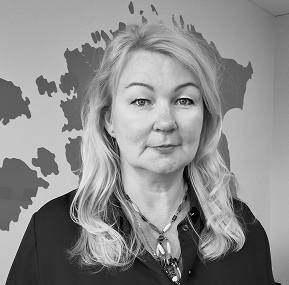 Meie meeskonnas Eestisse naasvate rahvuskaaslaste nõustamise eest vastutav Kaire Cocker annab ülevaate, kellele ja milliseid nõuandeid me rõõmuga jagame.
Meie meeskonnas Eestisse naasvate rahvuskaaslaste nõustamise eest vastutav Kaire Cocker annab ülevaate, kellele ja milliseid nõuandeid me rõõmuga jagame.
Riiklik „Rahvuskaaslaste programm“ toetab mitmeid väliseestlaskonnale suunatud tegevusi: eesti keele õpet välismaal, välis-eesti noorte ja eesti keele õpetajate keele- ja kultuurilaagrite korraldamist Eestis, tööd välis-eesti arhiivide ja kultuuripärandiga, välis-eesti kultuuriseltside tegevust, samuti välismaal elava eestlaskonna tagasipöördumist Eestisse.
Tagasipöördujatele nõustamisteenuse pakkumist alustas Integratsiooni Sihtasutus käesoleva aasta maist. Nõustaja aitab planeerida sujuvamat tagasipöördumist Eestisse. Nõustamine hõlmab nii praktilist infot, kui ka Eestis taas kohanemisega seotud teemasid.
Eestlaskonna ja Eesti kodanike tagasipöördumine toimub erinevatel põhjustel. Sageli langetatakse otsus Eestisse tagasipöördumiseks seoses laste kooliminekuga, pensionile jäämisega, samuti meelepärase kodu loomisega Eestis või kui on läbitud piiri taga pikaajaline õpinguperiood. Sageli ei piisa üksnes eri ametiasutuste kodulehtedel pakutavast teabest, vajalik on põhjalik nõustamine ning abi praktilistes küsimustes ja toimingutes.
Eestisse tagasipöördumine kulgeb sujuvamalt, kui tagasipöördumisotsus on eelnevalt hästi läbi mõeldud ning enda jaoks selgeks tehtud, millised juriidilised või muud haldustoimingud peab kodumaale naastes läbi tegema. Tihti ei ole tagasipöördujate keeletase ega ka teadmised Eesti ühiskonnakorraldusest ja riigis hakkamasaamiseks piisavad, sest kiiresti arenev digi-keskkond ja ka muutuv seadusandlus ning info vajalike teenuste kohta võib olla keeruline ja kättesaamatu.
Nõustame nii neid, kellel on tekkinud huvi ja soov Eestisse tagasi pöörduda kui ka neid, kes on Eestis juba uut elu alustanud. Maist alates on nõustamisele pöördunud poolsada huvilist, kellest pooled on oma tagasipöördumist alles planeerimas.
Rahvuskaaslaste nõustajaga ühendust võetud Murmanskist Kanadani, sh Ameerika lääne- ja idarannikult, Belgiast, Saksamaalt, Šveitsist, Soomest, Iirimaalt, Venemaalt ja Usbekistanist.
Veel täpsemat infot leiad sellel lingil.
Kogemused:
- Ljudmilla Saksamaalt on olnud ära 6 aastat ja tal tekkis soov pöörduda tagasi Eestisse koos oma tütrega. Ta kirjutas oma mõttest rahvuskaaslaste nõustajale Kaire Cockerile: „Ma ei tea täpselt, kuidas ma saan seda teha ja ma vajan abi või nõu.“ Sellest sai alguse kirjavahetus, kus nõustaja pakkus välja variante, kuidas tagasipöördumine sujuvamaks teha ja otsuse, kuidas täpselt tema teekond olema saab, tegi Ljudmilla juba ise. Augustis on ta tagasi Tallinnas uut elu alustamas.
- Aime, kes pöördub tagasi peale pikki aastaid (üle 30 aasta) Ameerikast, pöördus nõustaja poole, et uurida, kuidas leida kolimisfirma, kes on usaldusväärne. Aime kolib üle pika aja tagasi Tallinnasse ja kuna oli vaja palju isiklikke asju kaasa tuua, siis oli vaja teada, kuidas neid asju organiseerida ja kas Eestis on sellist teenust. Aime ütleb: „Ma olen väga tänulik info eest, mida teilt sain ja soovitan kindlasti teistel tagasipöördujatel Teiega ühendust võtta, sest selline teenus on väga vajalik“. Aime kolib Eestisse tagasi augusti lõpuks.
The national Countrymen Programme supports a range of activities aimed at the foreign Estonian community: Estonian language teaching abroad; the organisation of language and culture camps in Estonia for foreign Estonian youngsters and Estonian teachers; work involving foreign Estonian archives and cultural heritage; the activities of foreign Estonian cultural associations; and the return of the foreign Estonian community to Estonia.
In May this year the Integration Foundation began offering a consultation service to those returning to the country. An adviser works with the clients to plan for their smoother return to Estonia. This involves providing practical information and dealing with issues related to adapting to life in the country.
Estonian citizens and members of the Estonian community return or relocate to the country for a variety of reasons. Often the decision is connected to their children reaching school age, or themselves reaching retirement age; sometimes it stems from a desire to establish in the country the kind of home they have always wanted; in other cases the people involved have spent many years studying abroad. The information provided on the websites of various agencies is all too frequently insufficient for those returning to the country: they require proper consultation and assistance on practical matters and paperwork.
Returning to Estonia goes more smoothly if your decision to do so is carefully considered beforehand and you are clear on what legal and administrative procedures you will have to complete before and after your arrival. Often those returning or relocating to the country do not have a sufficient grasp of Estonian or knowledge of the way things are run in the country to get by, since information about required services – just like the rapidly evolving digital environment and changing legislation – can be complicated or even unavailable.
We advise those who are interested in or planning to return to Estonia as well as those who have already started their new lives in the country. Around 50 people have approached us since May, half of whom are only in the planning stages of returning to the country.
We have been contacted by people from the Arctic north of Russia to the west coast of the United States, from Uzbekistan to Canada and, closer to home, from Belgium, Germany, Finland, Ireland and Switzerland.
For more information see https://www.integratsioon.ee/tagasipoordujale.
Ljudmilla, who lives in Germany, has been away from Estonia for six years. She now plans to return to the country with her daughter. She wrote to our adviser Kaire Cocker, saying:
“I’m not exactly sure how I should go about it. I guess I need some help and advice.”
This led to an exchange of e-mails in which Kaire outlined to Ljudmilla a number of ways of making her return to the country easier, but it was Ljudmilla herself who made the final decisions.
She will be back in Tallinn starting her new life this August.
Aime, who is returning to Estonia after more than 30 years in the United States, contacted us to ask where she could find a reliable moving company.
She will be moving back to Tallinn, and since she has a lot of personal items to bring with her, she wanted to know how she could arrange it and whether such a service was available in Estonia.
She wrote to us to say: “I’m very grateful for the information you gave me. I’ll definitely recommend to anyone else returning to Estonia that they get in touch with you, because the service you offer is invaluable.”
Aime will be arriving back in Tallinn at the end of August.
Infot sündmuste kohta, mis toimuvad meie korraldamisel, osalemisel või toel leiad meie kodulehel avaldatud kalendrist.
Meie sihtasutuse viimaseid teadaandeid saad lugeda meie kodulehe uudiste rubriigis ning Integratsiooni Sihtasutuse või Eesti keele maja Facebooki kontol.
Integratsiooni Sihtasutus käivitas 2018 septembris Tallinnas ja Narvas eesti keele maja selleks, et pakkuda parimaid võimalusi eesti keele õppimiseks ja praktiseerimiseks. Kui hästi esimene õppeaasta möödus, saad lugeda käesoleva uudiskirja artiklis.
Tahame veel kaugemale jõuda. Selleks palume Sinu kaasabi ideede näol, mida veel võiks eesti keele maja ette võtta, et eesti keelt räägiks aina rohkem inimesi. Ideid ootame antud tagasisidevormi vahendusel kuni 1. juulini 2019.
Kõikide ideede autorite vahel loosime välja Apollo kinkekaardi 30 euro väärtuses.
Iga idee on teretulnud!
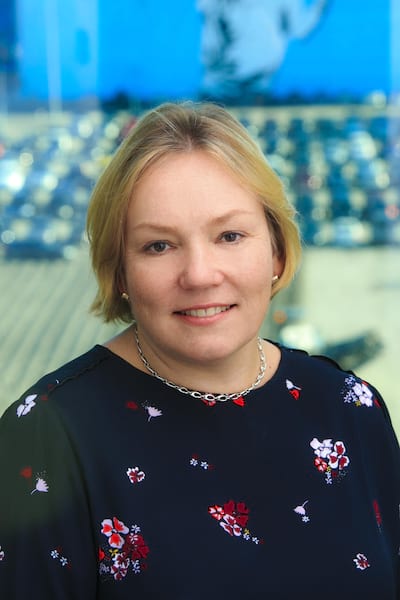
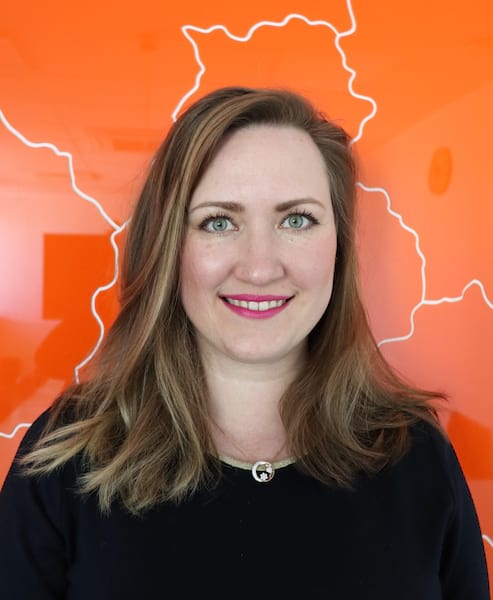
 The Volunteer Language Friends project that was initiated by the Integration Foundation and lasted from 20 March to 19 May united 885 people around the world for the purpose of learning and practising Estonian. As part of the project, 410 volunteer mentors helped 475 Estonian language learners to practise the spoken language, talking to them a few times a week via e-channels in Estonian on various vital topics.
The Volunteer Language Friends project that was initiated by the Integration Foundation and lasted from 20 March to 19 May united 885 people around the world for the purpose of learning and practising Estonian. As part of the project, 410 volunteer mentors helped 475 Estonian language learners to practise the spoken language, talking to them a few times a week via e-channels in Estonian on various vital topics.
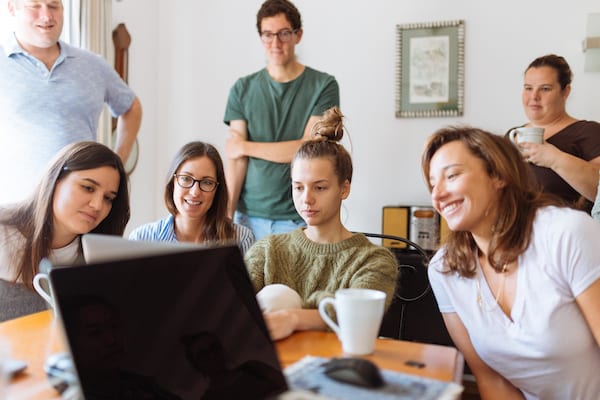
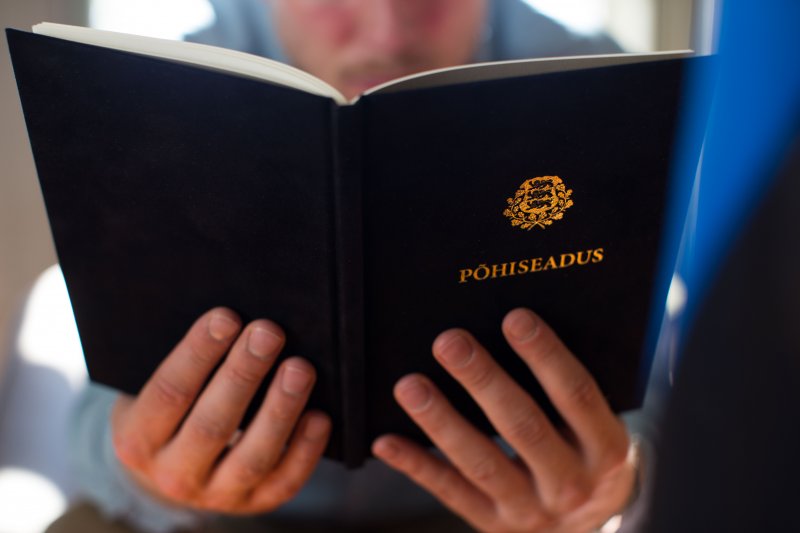
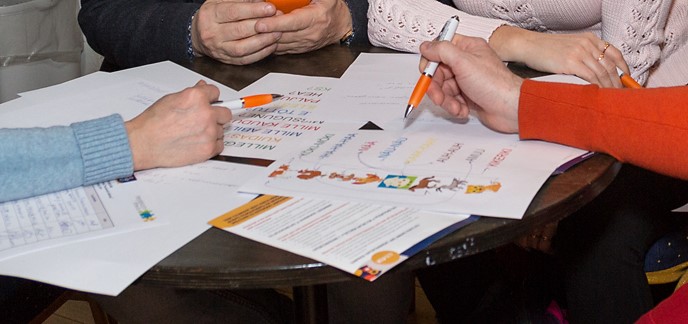
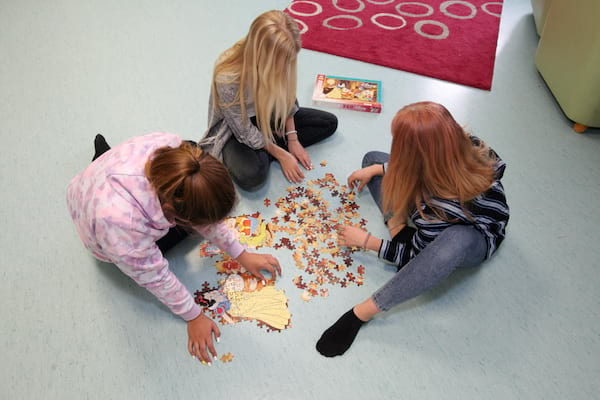
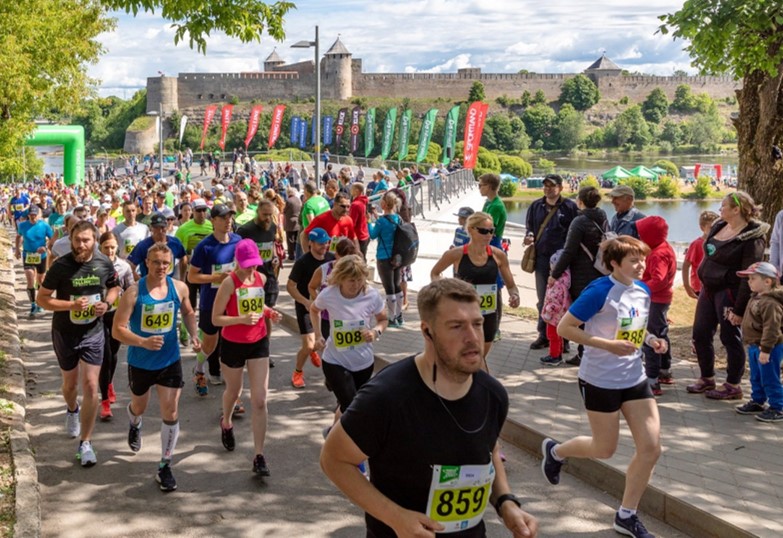
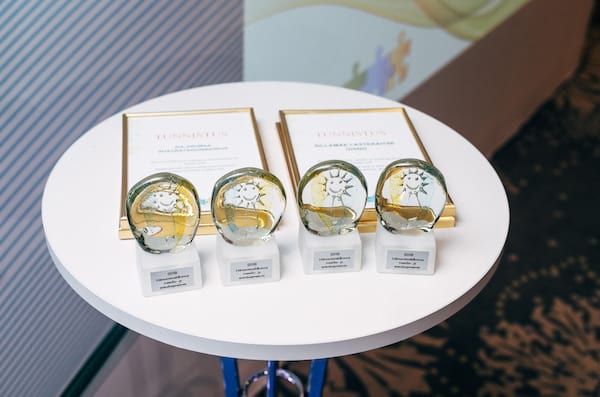


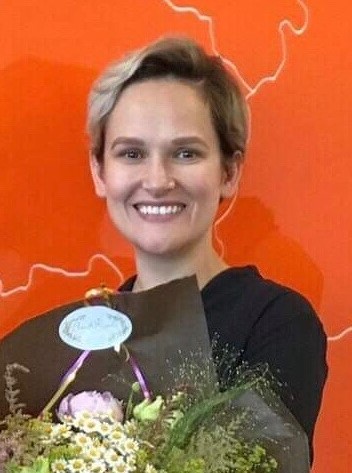 Aljona Kordontšuk: “As a new activity, in cooperation with the Estonian Folk Culture Centre, we have launched a course of cultural traditions in Tallinn and Narva, introducing Estonian customs, traditional holidays, rituals, folk songs and dances, and much more. The course includes exciting lectures, seminars, discussions and hands-on activities. Active participants can enjoy a trip to Setomaa at the end of the course. The course has proven to be very popular and there are only few free seats left for the lectures.
Aljona Kordontšuk: “As a new activity, in cooperation with the Estonian Folk Culture Centre, we have launched a course of cultural traditions in Tallinn and Narva, introducing Estonian customs, traditional holidays, rituals, folk songs and dances, and much more. The course includes exciting lectures, seminars, discussions and hands-on activities. Active participants can enjoy a trip to Setomaa at the end of the course. The course has proven to be very popular and there are only few free seats left for the lectures.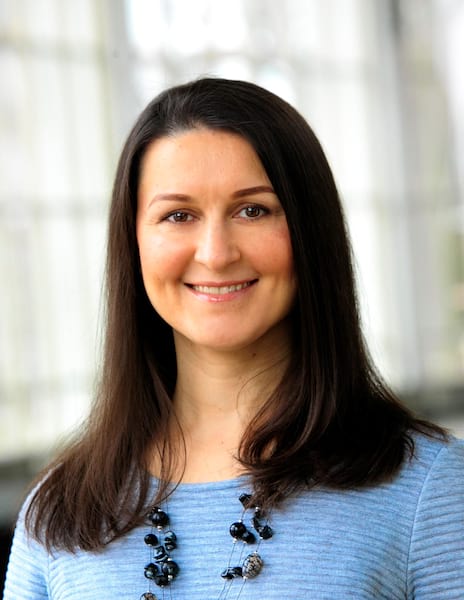
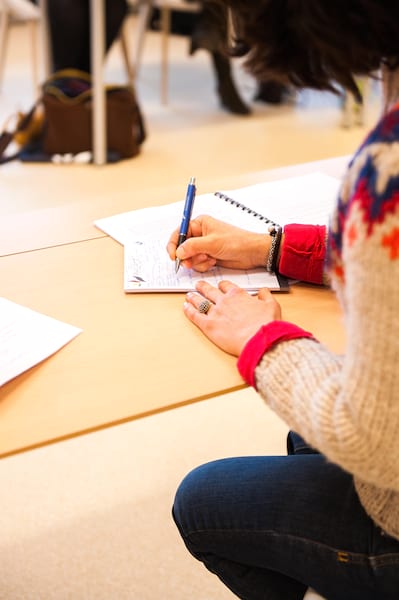 Through the online registration of the Integration Foundation in January, 736 people have started their free Estonian language studies. The next opportunity to sign up for the courses will open in March and August, with the Integration Foundation offering another up to 4,000 free A1-C1 level study places.
Through the online registration of the Integration Foundation in January, 736 people have started their free Estonian language studies. The next opportunity to sign up for the courses will open in March and August, with the Integration Foundation offering another up to 4,000 free A1-C1 level study places.
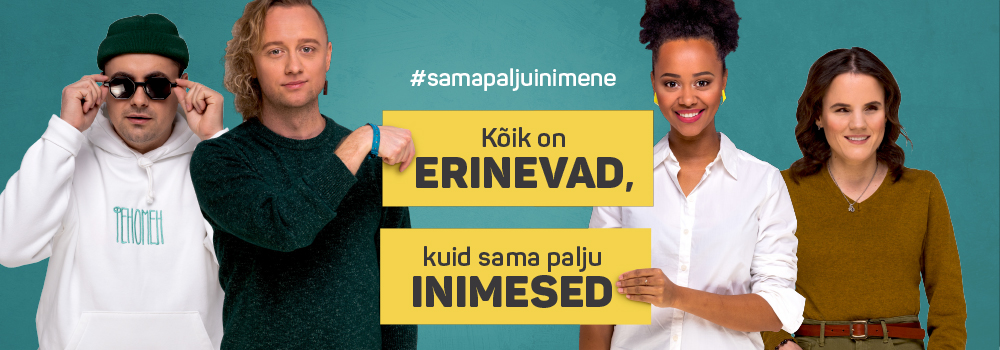
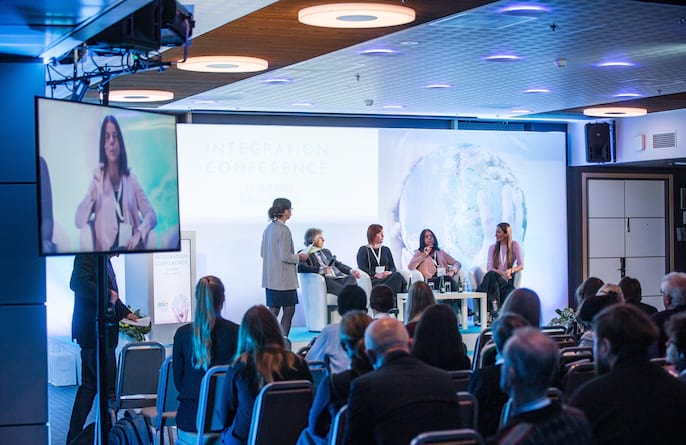
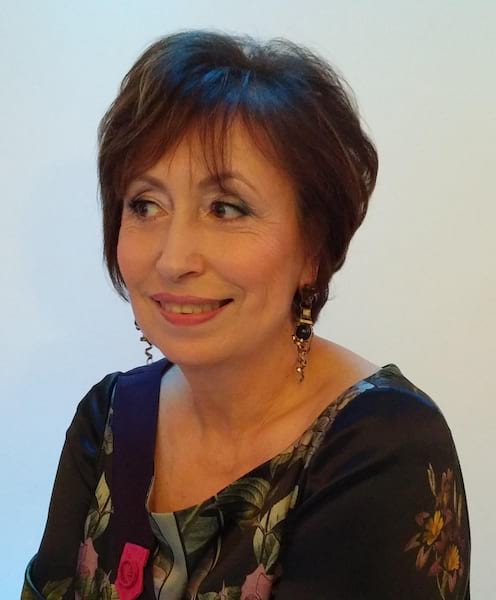 Birute Klaas-Lang, Professor of Estonian as a foreign language at the University of Tartu, and linguist, has been leading the Supervisory Board of the Integration Foundation for the last six months. In total, Birute has contributed to the Board of the Foundation for a year and a half. We asked her about the Integration Foundation and developments in adult language learning.
Birute Klaas-Lang, Professor of Estonian as a foreign language at the University of Tartu, and linguist, has been leading the Supervisory Board of the Integration Foundation for the last six months. In total, Birute has contributed to the Board of the Foundation for a year and a half. We asked her about the Integration Foundation and developments in adult language learning. Irene Käosaar, Director of the Integration Foundation, looks back at the achievements of the past year and talks about what the Foundation's team, partners and Estonian language learners can expect from the new year.
Irene Käosaar, Director of the Integration Foundation, looks back at the achievements of the past year and talks about what the Foundation's team, partners and Estonian language learners can expect from the new year.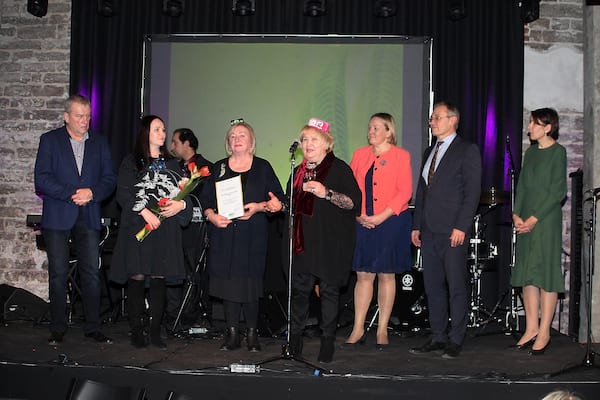 On December 13th the Ministry of Culture and the Integration Foundation recognized the most outstanding developers in the field of integration for 2018-2019. Integration prizes went to Ida-Virumaa Society of Tatar Culture, Tartu International House, author and editor of Raadio 4 broadcast “Keelekõdi” - Andrei Hussainov, and Logistika Pluss OÜ.
On December 13th the Ministry of Culture and the Integration Foundation recognized the most outstanding developers in the field of integration for 2018-2019. Integration prizes went to Ida-Virumaa Society of Tatar Culture, Tartu International House, author and editor of Raadio 4 broadcast “Keelekõdi” - Andrei Hussainov, and Logistika Pluss OÜ.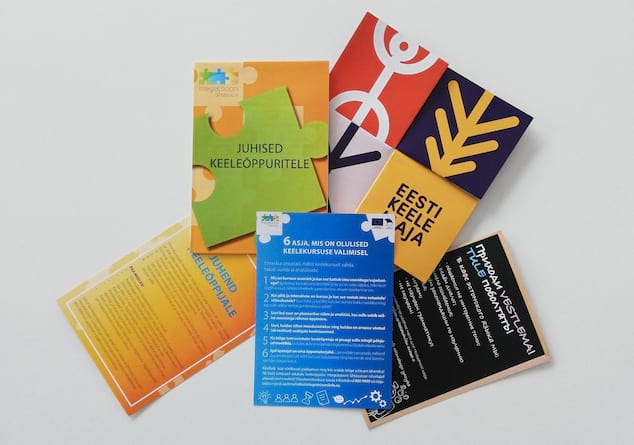 At the beginning of next year, registration for the Estonian language level courses by the Integration Foundation will take place again. Before you enrol in a course, it's a good idea to find out which form and level of study suit you best. It is worth remembering that in addition to the courses offered by the Integration Foundation, there are many other opportunities for learning Estonian for free.
At the beginning of next year, registration for the Estonian language level courses by the Integration Foundation will take place again. Before you enrol in a course, it's a good idea to find out which form and level of study suit you best. It is worth remembering that in addition to the courses offered by the Integration Foundation, there are many other opportunities for learning Estonian for free.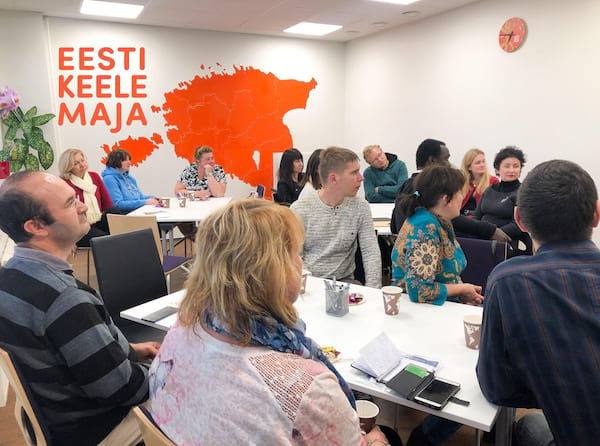 In spring, the grammar course held in Tallinn's Estonian Language House proved very popular with our students. As we are still addressed with a desire to study and practice Estonian grammar, we decided to open a new group for advanced learners next year.
In spring, the grammar course held in Tallinn's Estonian Language House proved very popular with our students. As we are still addressed with a desire to study and practice Estonian grammar, we decided to open a new group for advanced learners next year. If you wish to study Estonian independently during the holidays and practice it with the help of a computer or a smart device, there are several possibilities. Here are some of them that you can use for free.
If you wish to study Estonian independently during the holidays and practice it with the help of a computer or a smart device, there are several possibilities. Here are some of them that you can use for free.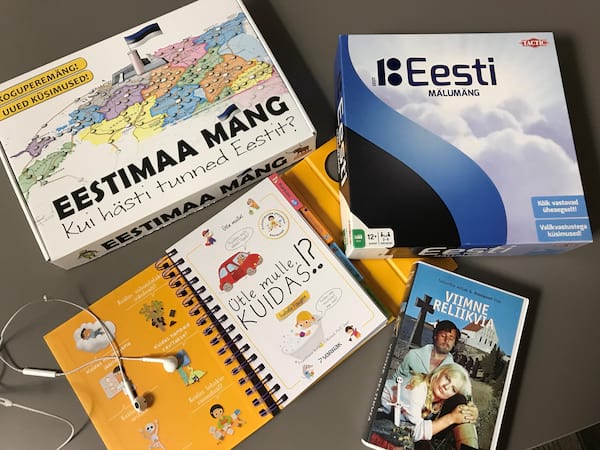 Use these simple recommendations to develop your language skills every day step-by-step with little effort.
Use these simple recommendations to develop your language skills every day step-by-step with little effort. Joining the Ministry of Education and Research as the Deputy Secretary General for General Education, Youth Affairs and Language Policy this August was Kristi Vinter-Nemvalts. With a doctorate in educational science, she spent many years lecturing at Tallinn University and headed up its Pedagogical College, Educational Policy Centre and School of Educational Sciences. In September she became the newest member of the supervisory board of the Integration Foundation. We asked her a few questions about integration and adult language studies.
Joining the Ministry of Education and Research as the Deputy Secretary General for General Education, Youth Affairs and Language Policy this August was Kristi Vinter-Nemvalts. With a doctorate in educational science, she spent many years lecturing at Tallinn University and headed up its Pedagogical College, Educational Policy Centre and School of Educational Sciences. In September she became the newest member of the supervisory board of the Integration Foundation. We asked her a few questions about integration and adult language studies.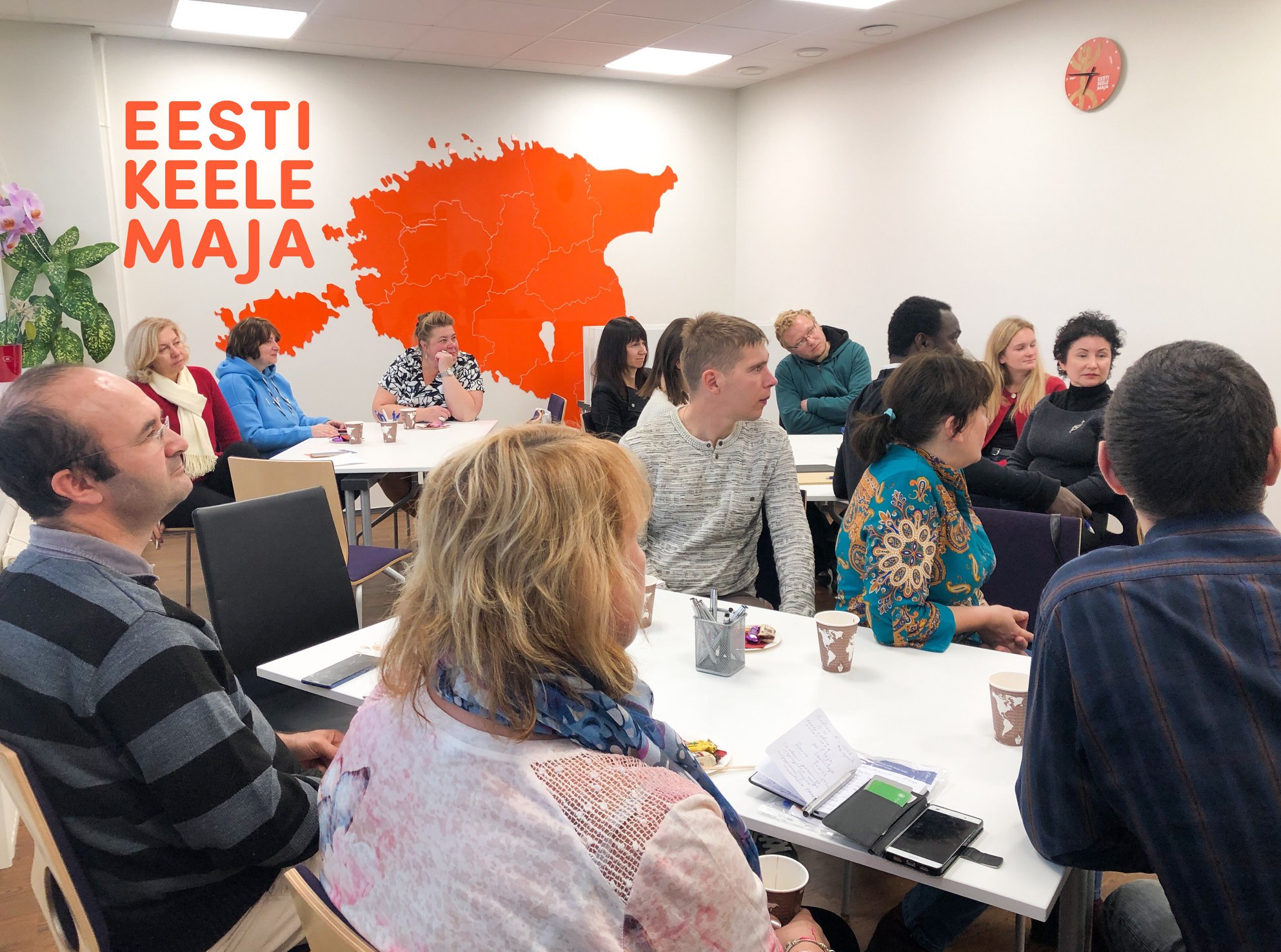 Estonia’s draft budget for the year ahead will see an additional two million euros allocated to the Ministry of Culture for the teaching of Estonian to adult learners. As a result, the Estonian Language Houses of the Integration Foundation will be able to offer free language courses to as many as 4000 participants.
Estonia’s draft budget for the year ahead will see an additional two million euros allocated to the Ministry of Culture for the teaching of Estonian to adult learners. As a result, the Estonian Language Houses of the Integration Foundation will be able to offer free language courses to as many as 4000 participants.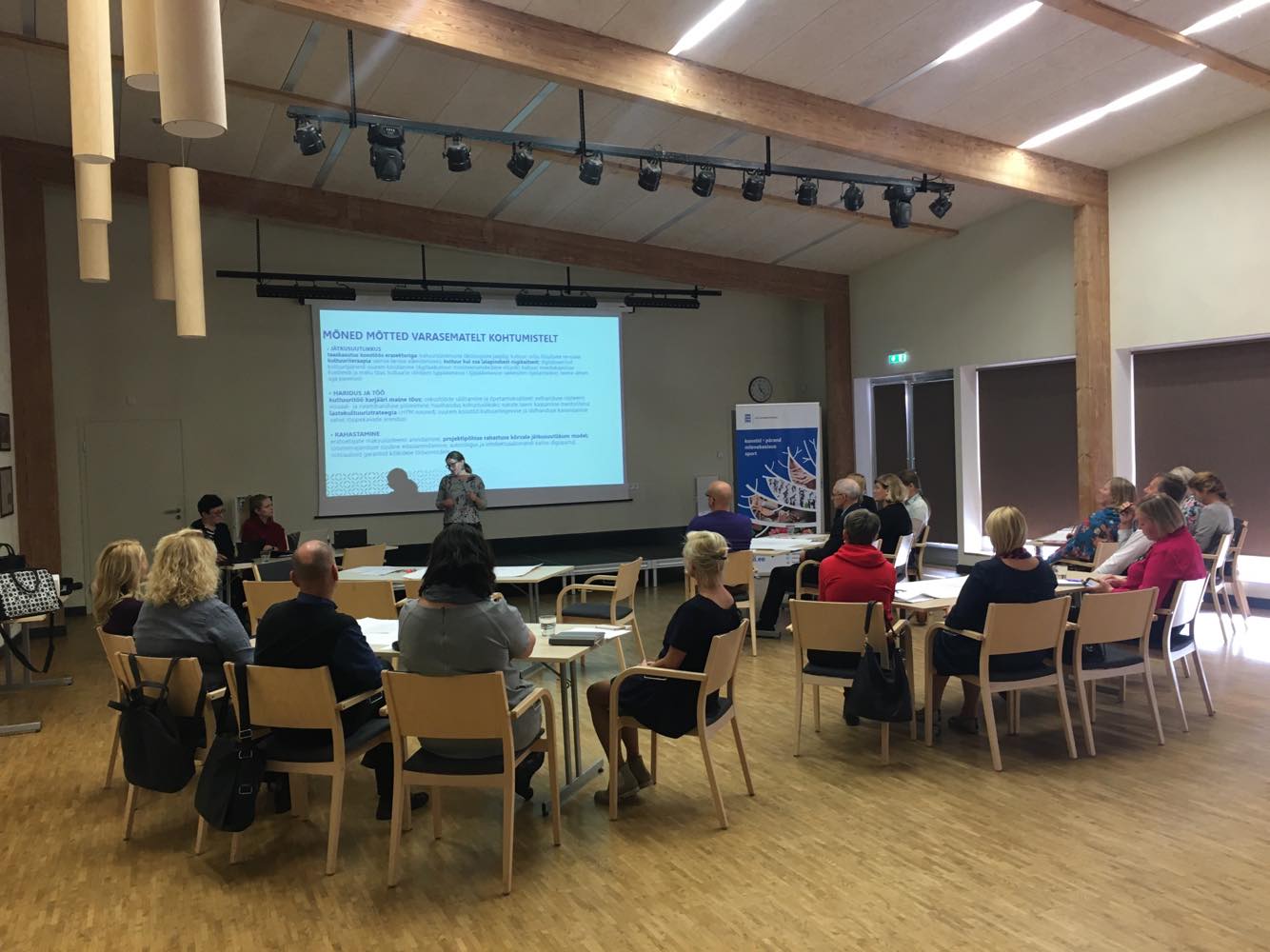 This autumn the Ministry of Culture is organising discussion events in every county in Estonia to review the material gathered to date for the drafting of the ‘Integrating Estonia 2030’ development plan.
This autumn the Ministry of Culture is organising discussion events in every county in Estonia to review the material gathered to date for the drafting of the ‘Integrating Estonia 2030’ development plan.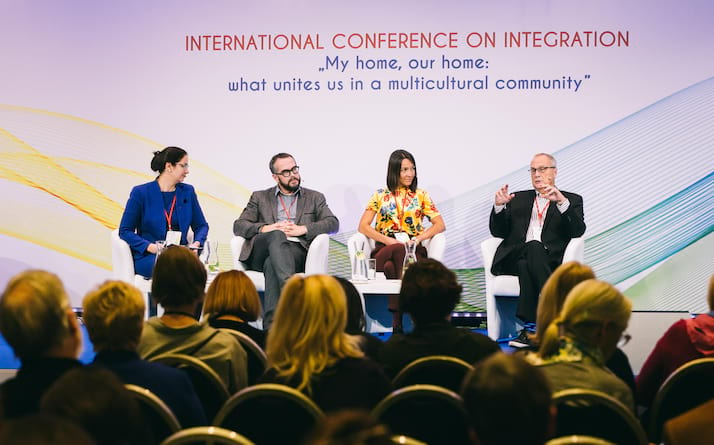 An international conference entitled ‘Shared Language: Integration through Multilingualism’ is being held in Tallinn on 14 & 15 November. The conference will bring together recognised experts from the United States, Canada, the United Kingdom, Latvia, Denmark, Norway, Germany and Estonia to explore identity, education and labour market issues in the light of multilingualism.
An international conference entitled ‘Shared Language: Integration through Multilingualism’ is being held in Tallinn on 14 & 15 November. The conference will bring together recognised experts from the United States, Canada, the United Kingdom, Latvia, Denmark, Norway, Germany and Estonia to explore identity, education and labour market issues in the light of multilingualism. This October the Integration Foundation launched a series of meetings for those who have returned to Estonia from living abroad in order to help them better cope with life in the country and make contact with others going through the same experience. The meetings will continue in November and December.
This October the Integration Foundation launched a series of meetings for those who have returned to Estonia from living abroad in order to help them better cope with life in the country and make contact with others going through the same experience. The meetings will continue in November and December.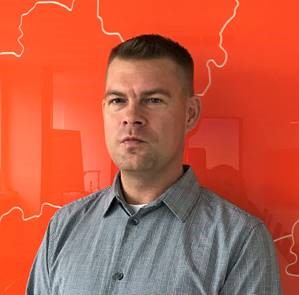 Joining the Integration Foundation at the start of October as an information and cooperation specialist was Tarmo Saks.
Joining the Integration Foundation at the start of October as an information and cooperation specialist was Tarmo Saks. Since 1 October 2019 the main office of the Integration Foundation in Narva and its Estonian Language House have been operating out of new premises at Linda 2 in the heart of the city – and more and more projects related to Estonian language studies and practice are being launched there.
Since 1 October 2019 the main office of the Integration Foundation in Narva and its Estonian Language House have been operating out of new premises at Linda 2 in the heart of the city – and more and more projects related to Estonian language studies and practice are being launched there. Projects being launched in the near future include a heritage culture study programme for language immersion teachers from and the directors of kindergartens in Narva, which will start at the end of October. As part of the programme, the participants will familiarise themselves with the work of kindergartens in Pärnu and take part in a combined seminar and work experience event to learn about Estonian folk culture and pass that information on to their own charges. They will find out about old traditions, rituals and beliefs as well as folk music, songs and song-based games. The study programme is being organised by the Estonian Folk Culture Centre.
Projects being launched in the near future include a heritage culture study programme for language immersion teachers from and the directors of kindergartens in Narva, which will start at the end of October. As part of the programme, the participants will familiarise themselves with the work of kindergartens in Pärnu and take part in a combined seminar and work experience event to learn about Estonian folk culture and pass that information on to their own charges. They will find out about old traditions, rituals and beliefs as well as folk music, songs and song-based games. The study programme is being organised by the Estonian Folk Culture Centre.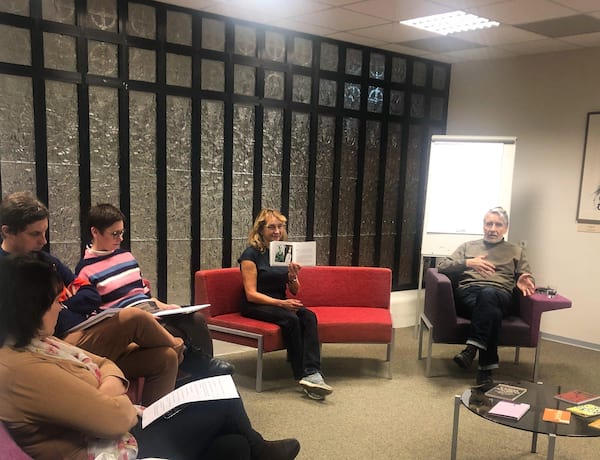 The 2019/2020 academic year has so far seen 14 groups taking up studies at the Estonian Language House in Tallinn, which is almost twice as many as in the same period last year. In addition to language courses, a number of events are held each week to allow participants to practise their Estonian. One new way of doing so is the Book Club, while another is a fun form of language practice that has been launched in a local club in cooperation with the Kalamaja community.
The 2019/2020 academic year has so far seen 14 groups taking up studies at the Estonian Language House in Tallinn, which is almost twice as many as in the same period last year. In addition to language courses, a number of events are held each week to allow participants to practise their Estonian. One new way of doing so is the Book Club, while another is a fun form of language practice that has been launched in a local club in cooperation with the Kalamaja community.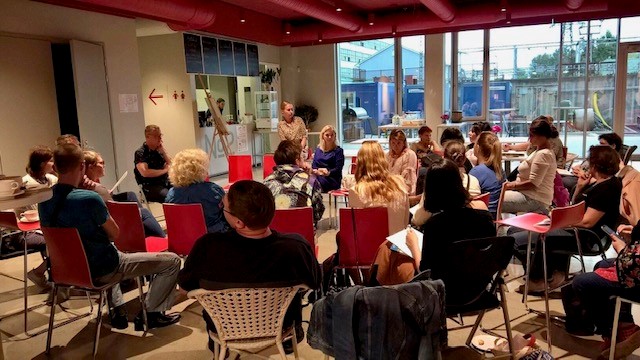 This year the Estonian Language House in Tallinn has launched cooperation with the Estonian Film Institute, whose support has given learners the chance to watch a range of classic Estonian films.
This year the Estonian Language House in Tallinn has launched cooperation with the Estonian Film Institute, whose support has given learners the chance to watch a range of classic Estonian films.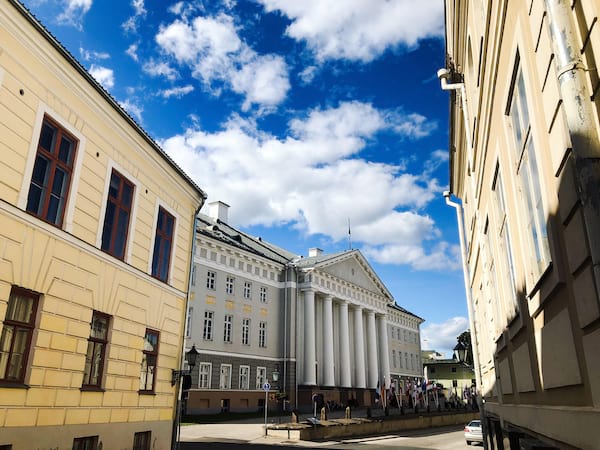
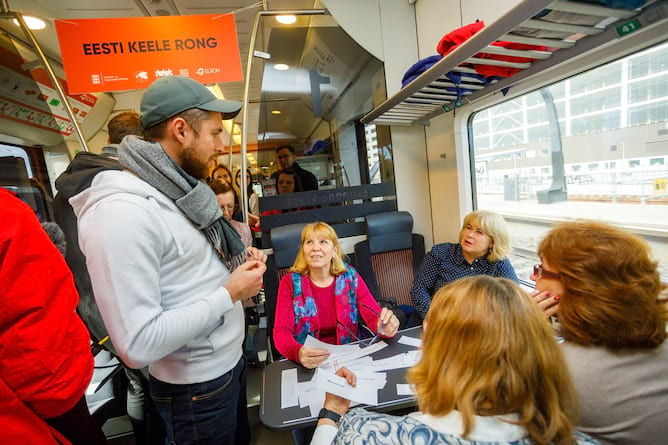 It was all aboard the language train from 24-26 September, when passengers between Tallinn and Narva had the opportunity to study Estonian free of charge. Language games and exercises were led in a special carriage by teachers from the Estonian Language Houses in Tallinn and Narva. During the journeys, anyone interested had the chance to talk to a language consultant, send their friends a language train postcard and listen to podcasts.
It was all aboard the language train from 24-26 September, when passengers between Tallinn and Narva had the opportunity to study Estonian free of charge. Language games and exercises were led in a special carriage by teachers from the Estonian Language Houses in Tallinn and Narva. During the journeys, anyone interested had the chance to talk to a language consultant, send their friends a language train postcard and listen to podcasts.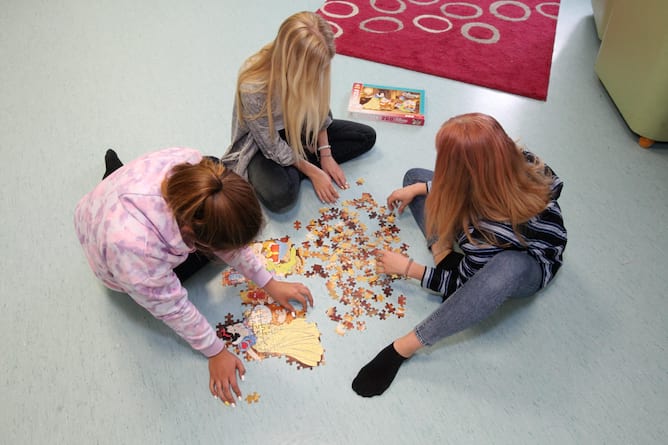
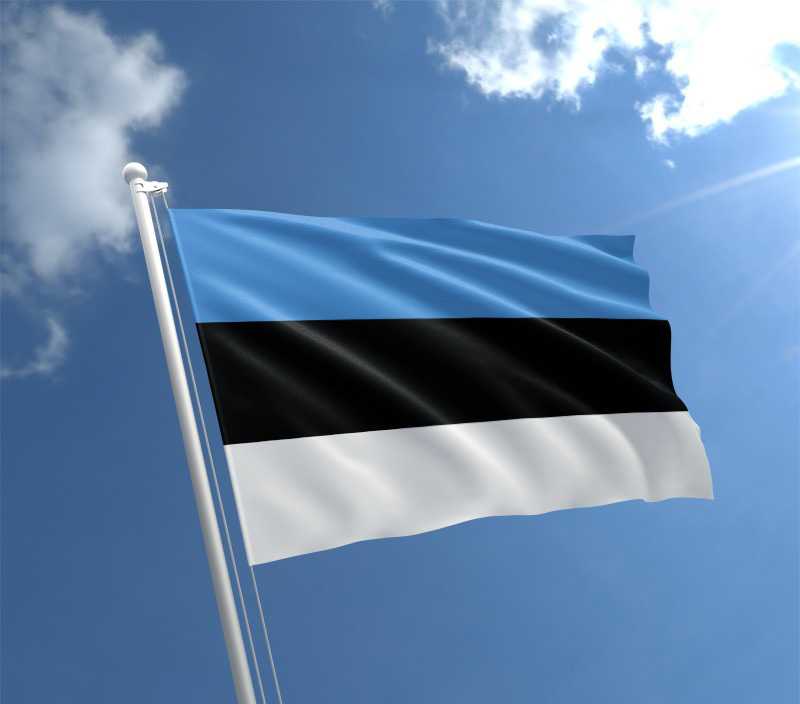 Citizens Day is marked on 26 November, and this year the Integration Foundation is once again organising an exciting online quiz about Estonia’s recent past in honour of the occasion. It will be taking place from 18-29 November, with a focus on interesting events and life in Estonia.
Citizens Day is marked on 26 November, and this year the Integration Foundation is once again organising an exciting online quiz about Estonia’s recent past in honour of the occasion. It will be taking place from 18-29 November, with a focus on interesting events and life in Estonia.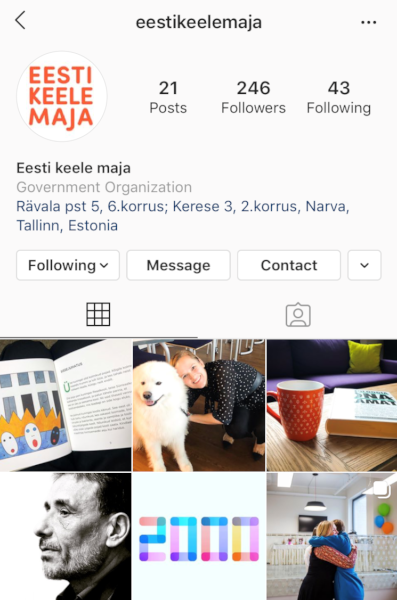 Events at the Estonian Language Houses in Tallinn and Narva can now be followed on Instagram (@eestikeelemaja).
Events at the Estonian Language Houses in Tallinn and Narva can now be followed on Instagram (@eestikeelemaja).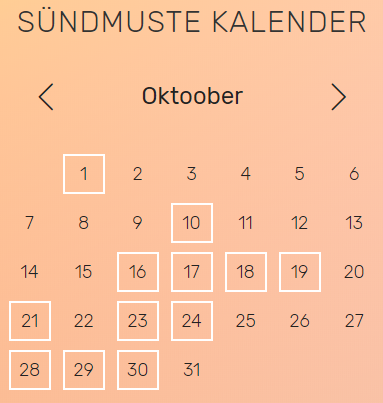

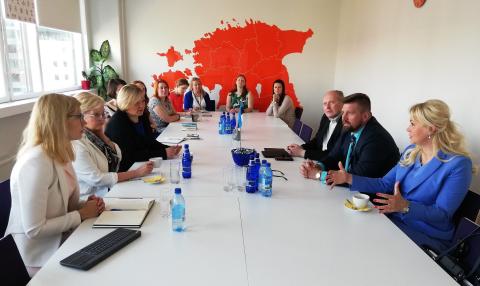
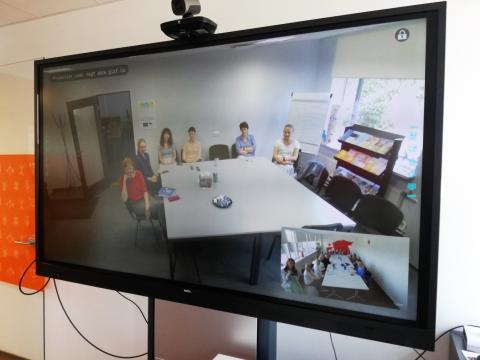

 Integratsiooni Sihtasutuse keeleõppe valdkonnajuht
Integratsiooni Sihtasutuse keeleõppe valdkonnajuht  Integratsiooni Sihtasutuse rahvusvähemuste valdkonnajuht
Integratsiooni Sihtasutuse rahvusvähemuste valdkonnajuht  Meie meeskonnas Eestisse naasvate rahvuskaaslaste nõustamise eest vastutav
Meie meeskonnas Eestisse naasvate rahvuskaaslaste nõustamise eest vastutav 
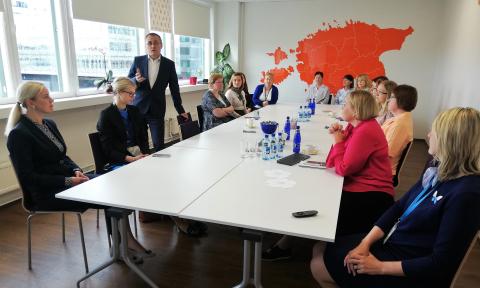
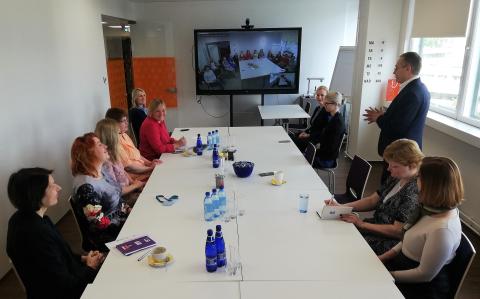
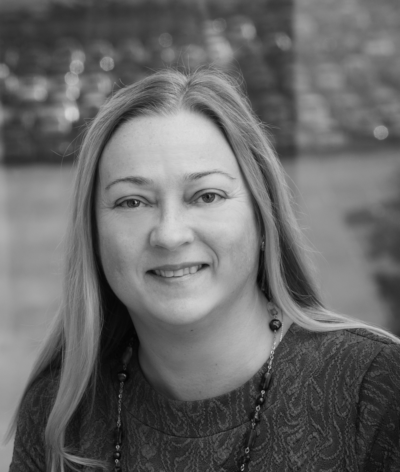
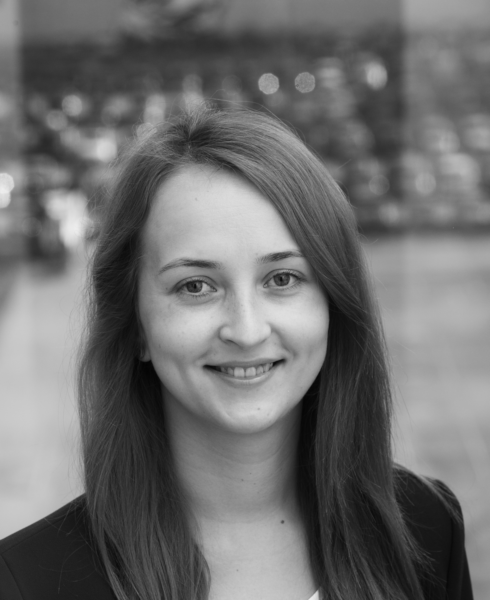
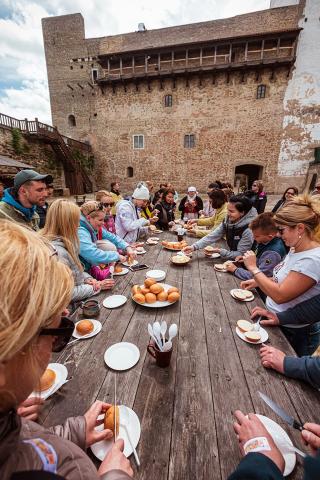
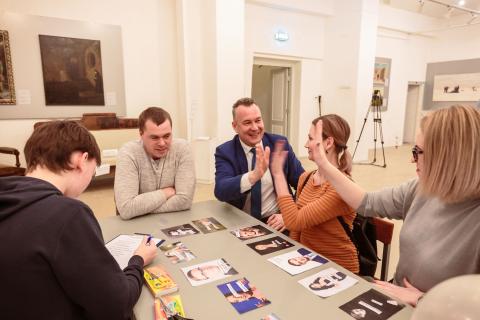
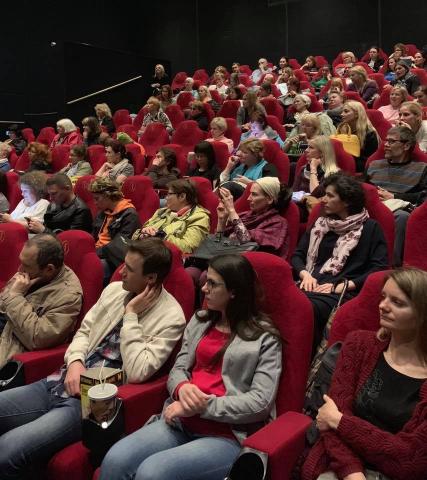
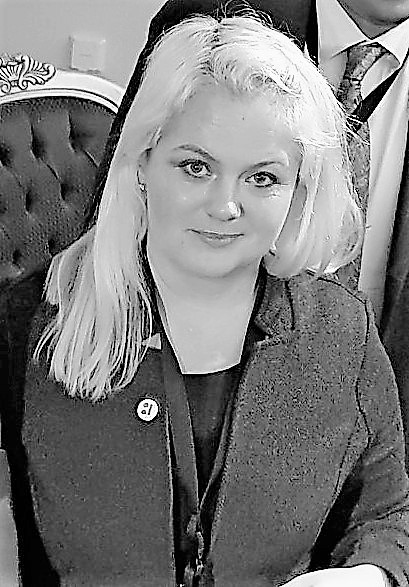
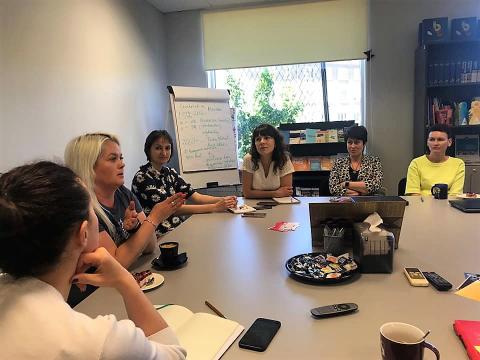
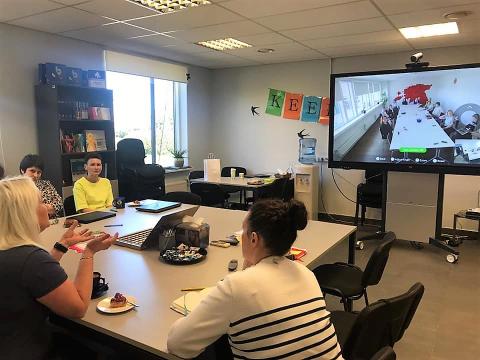
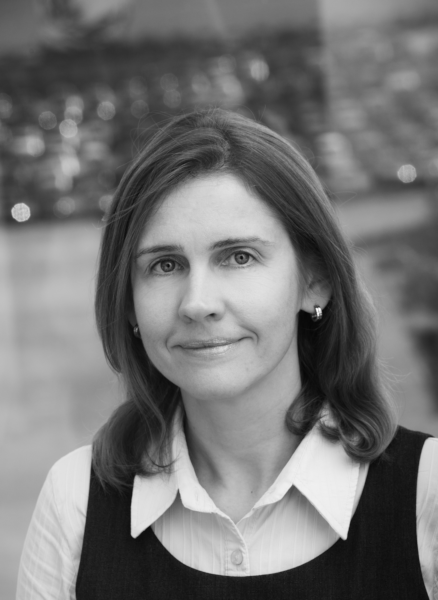

 You can choose events which are organised, assisted or supported by our Foundation to participate at the
You can choose events which are organised, assisted or supported by our Foundation to participate at the 


 You can choose events which are organised, assisted or supported by our Foundation to participate in May and June 2019 at the
You can choose events which are organised, assisted or supported by our Foundation to participate in May and June 2019 at the 


 The establishment of the Estonian Language Centres in Tallinn and Narva has been voted the fourth greatest language achievement of 2018 among a field of 20 in a popular vote.
The establishment of the Estonian Language Centres in Tallinn and Narva has been voted the fourth greatest language achievement of 2018 among a field of 20 in a popular vote.
 Katja Ljubobratets joined our team in March as the Integration Foundation’s new Head of Communications.
Katja Ljubobratets joined our team in March as the Integration Foundation’s new Head of Communications.










 The registration period for Estonian language courses will open soon and will be available twice a year - January and August.
The registration period for Estonian language courses will open soon and will be available twice a year - January and August.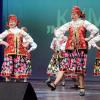 As of 23. January 2019, the umbrella organisations of national minority cultural associations can apply for support for their activities. The application round is designed to contribute to the sustainable operations and systematic development of the umbrella organisations and their members in Estonia. This year’s application round, financed by the Ministry of Culture, is valued at €457,000. Applications can be submitted to the Integration Foundation until 25 February.
As of 23. January 2019, the umbrella organisations of national minority cultural associations can apply for support for their activities. The application round is designed to contribute to the sustainable operations and systematic development of the umbrella organisations and their members in Estonia. This year’s application round, financed by the Ministry of Culture, is valued at €457,000. Applications can be submitted to the Integration Foundation until 25 February.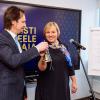 On January 15th the Integration Foundation has opened the long-awaited Tallinn Estonian language house, were people of various backgrounds with different native languages can learn and practice Estonian as well as receive practical advice about living, learning and working in Estonia.
On January 15th the Integration Foundation has opened the long-awaited Tallinn Estonian language house, were people of various backgrounds with different native languages can learn and practice Estonian as well as receive practical advice about living, learning and working in Estonia. Since 2 January 2019 the Integration Foundation has been based in Narva.
Since 2 January 2019 the Integration Foundation has been based in Narva.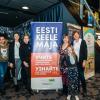 There is no better sight than an entire room full of people from Narva with their eyes glued to a cinema screen wondering whether the Tondikaku family will save the forest. Will the owls hoot happily ever after while the lynx frolics in the crisp white snow? Half the audience were biting their nails as they waited anxiously to find out, and some were even brought to tears!
There is no better sight than an entire room full of people from Narva with their eyes glued to a cinema screen wondering whether the Tondikaku family will save the forest. Will the owls hoot happily ever after while the lynx frolics in the crisp white snow? Half the audience were biting their nails as they waited anxiously to find out, and some were even brought to tears!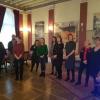 Irene Käosaar, the director of the Integration Foundation, says that the lack of qualified language teachers represents one of the greatest restrictions on the teaching of Estonian to people of other nationalities living in the country. “Interest in learning the language is growing all the time,” she explained. “So far the Integration Foundation’s been outsourcing all of its Estonian courses, but in 2019 we’re opening Estonian Language Centres in Tallinn and Narva, and in order to boost the number of people studying we’ll be starting to organise language courses ourselves as well. That’s why we worked with the University of Tartu to develop a special training programme that focuses on the specific nature of teaching Estonian as a second language to adults. I’m really glad that the 10 teachers we chose from among the dozens of candidates last spring have now all been awarded their diplomas!”
Irene Käosaar, the director of the Integration Foundation, says that the lack of qualified language teachers represents one of the greatest restrictions on the teaching of Estonian to people of other nationalities living in the country. “Interest in learning the language is growing all the time,” she explained. “So far the Integration Foundation’s been outsourcing all of its Estonian courses, but in 2019 we’re opening Estonian Language Centres in Tallinn and Narva, and in order to boost the number of people studying we’ll be starting to organise language courses ourselves as well. That’s why we worked with the University of Tartu to develop a special training programme that focuses on the specific nature of teaching Estonian as a second language to adults. I’m really glad that the 10 teachers we chose from among the dozens of candidates last spring have now all been awarded their diplomas!”